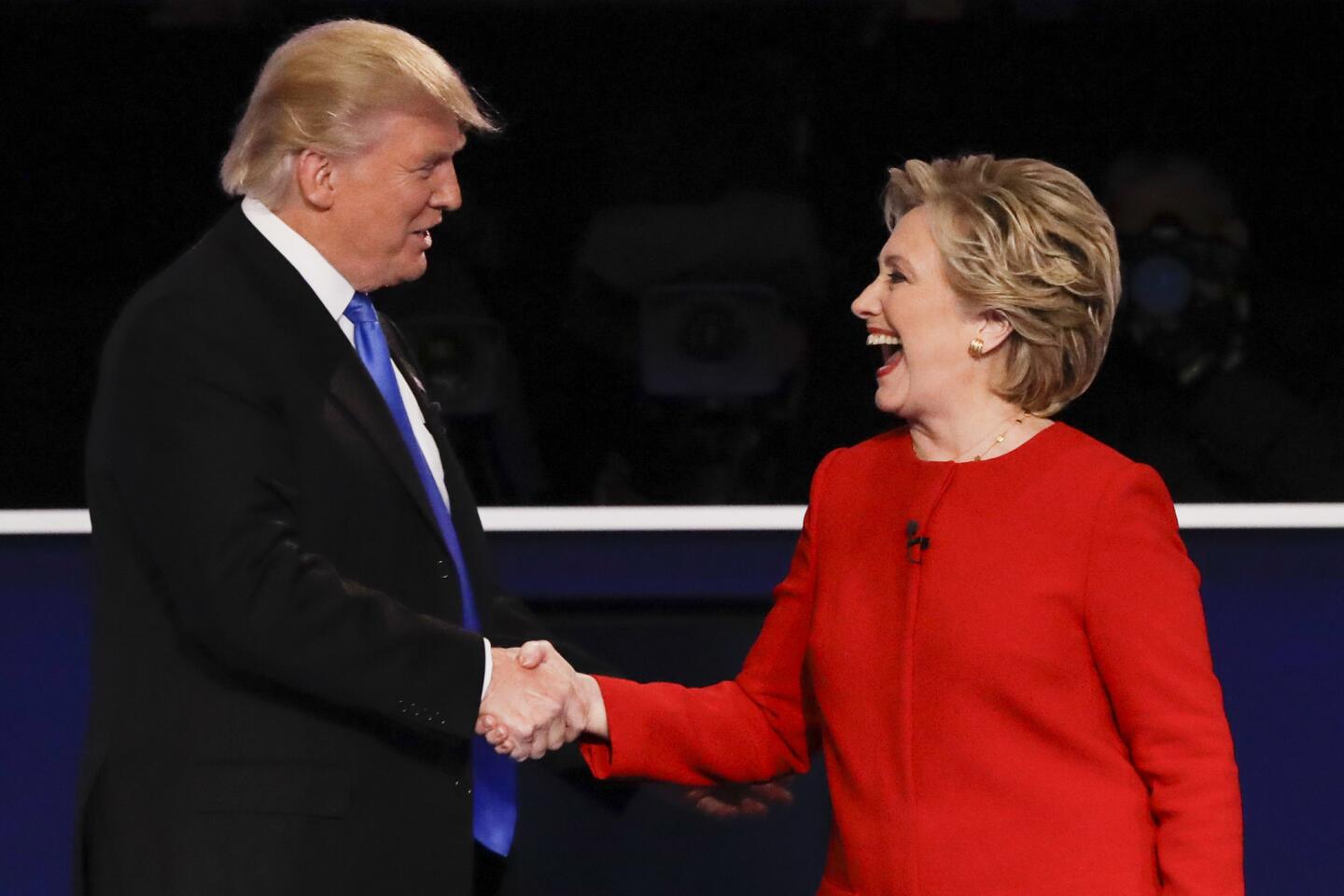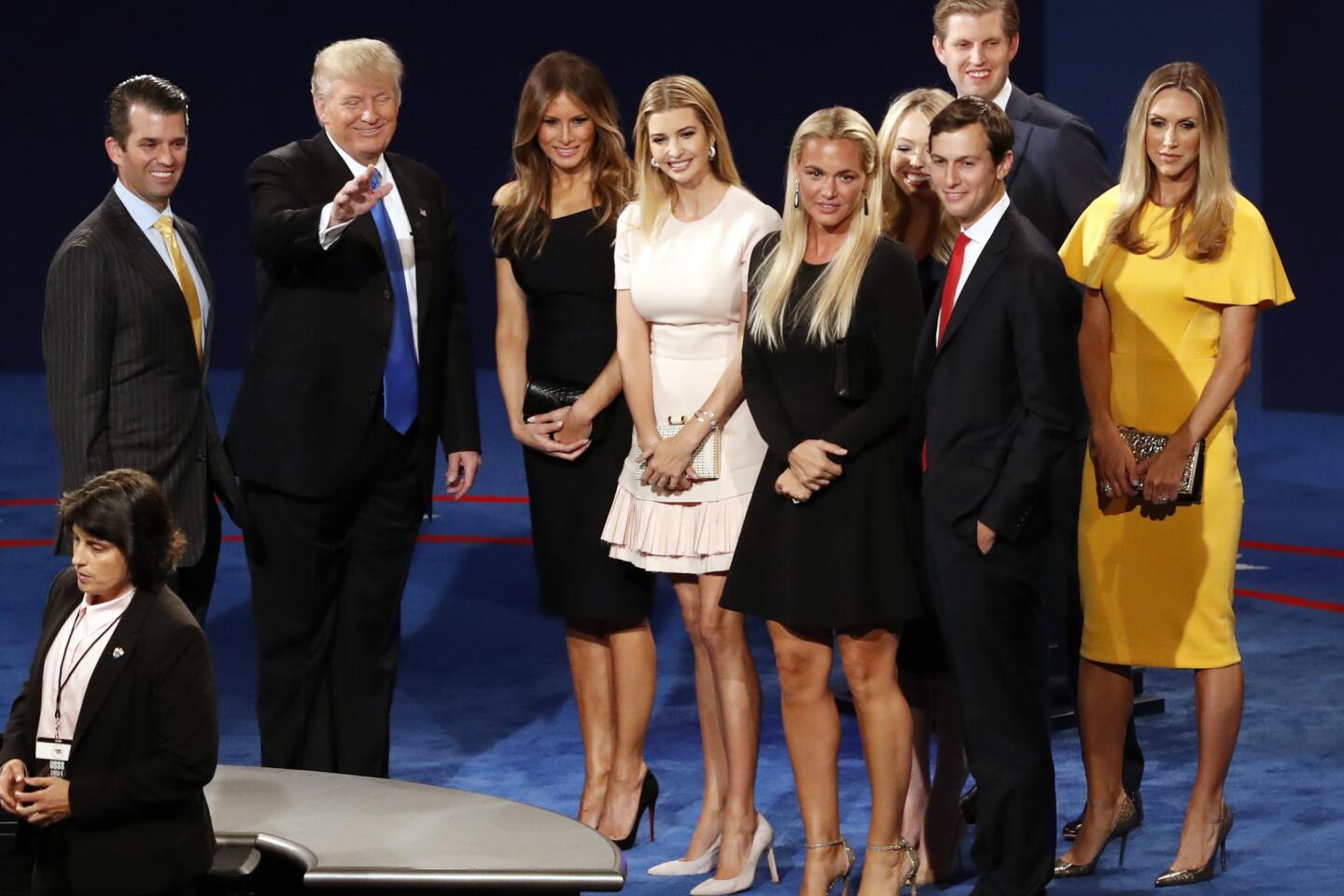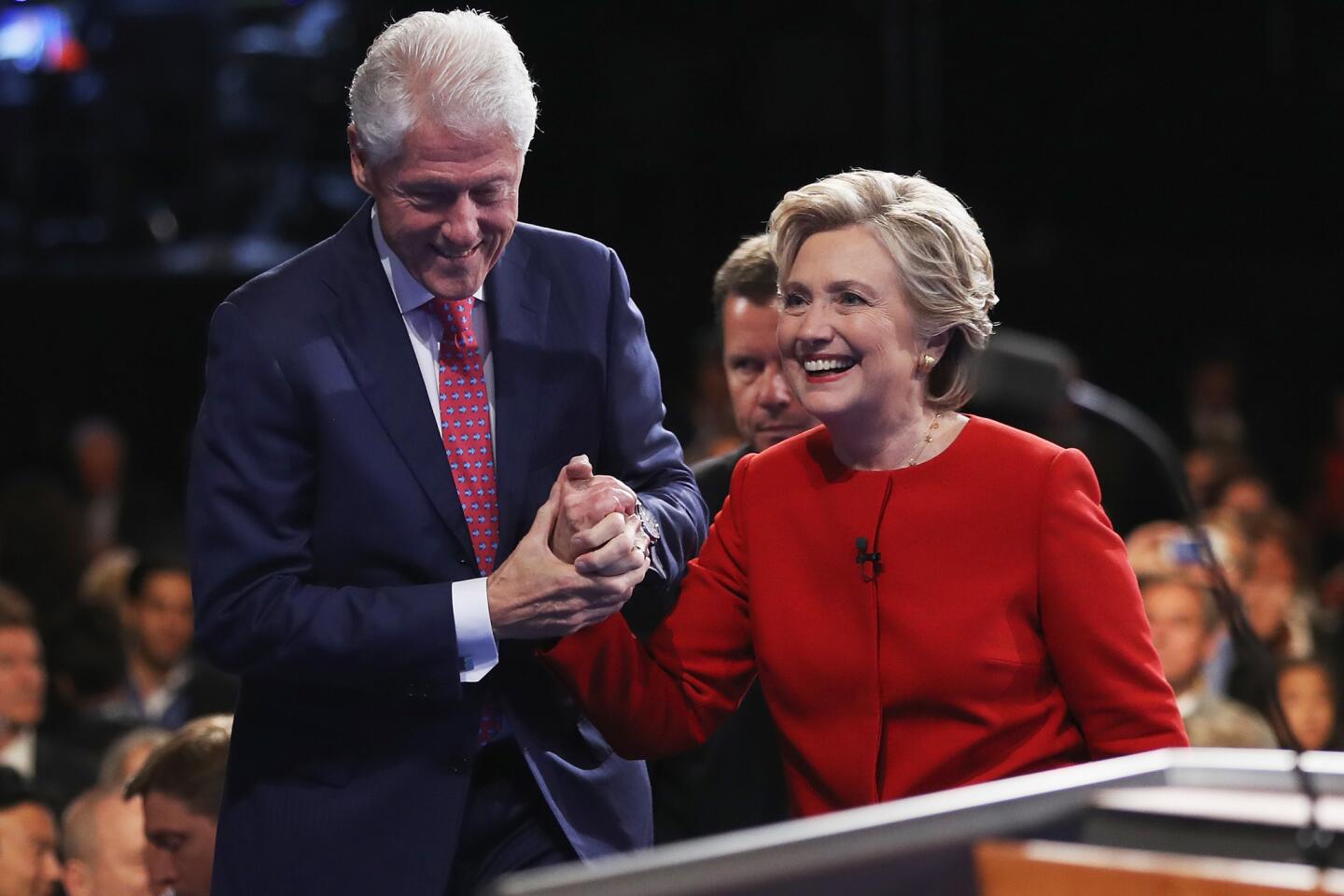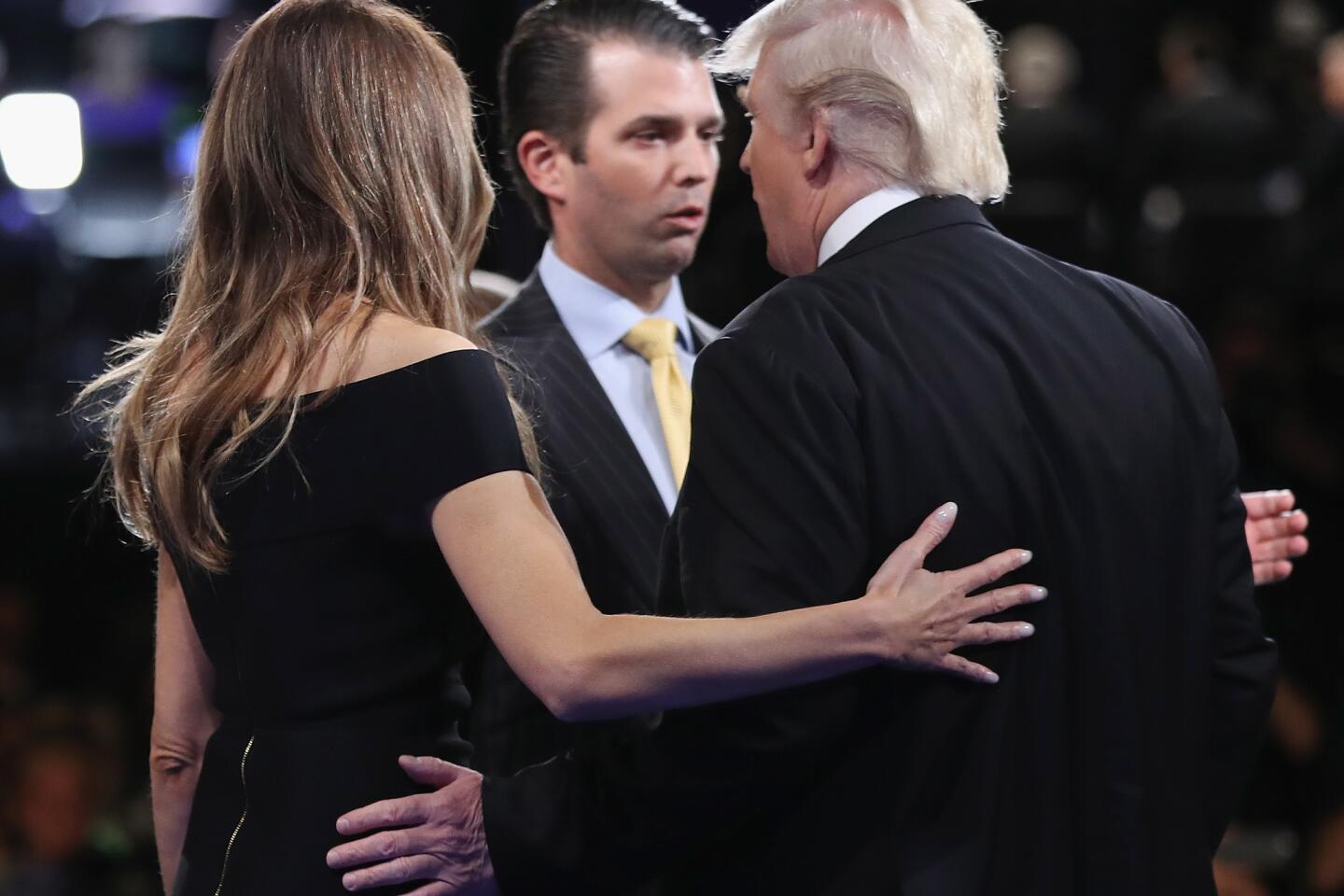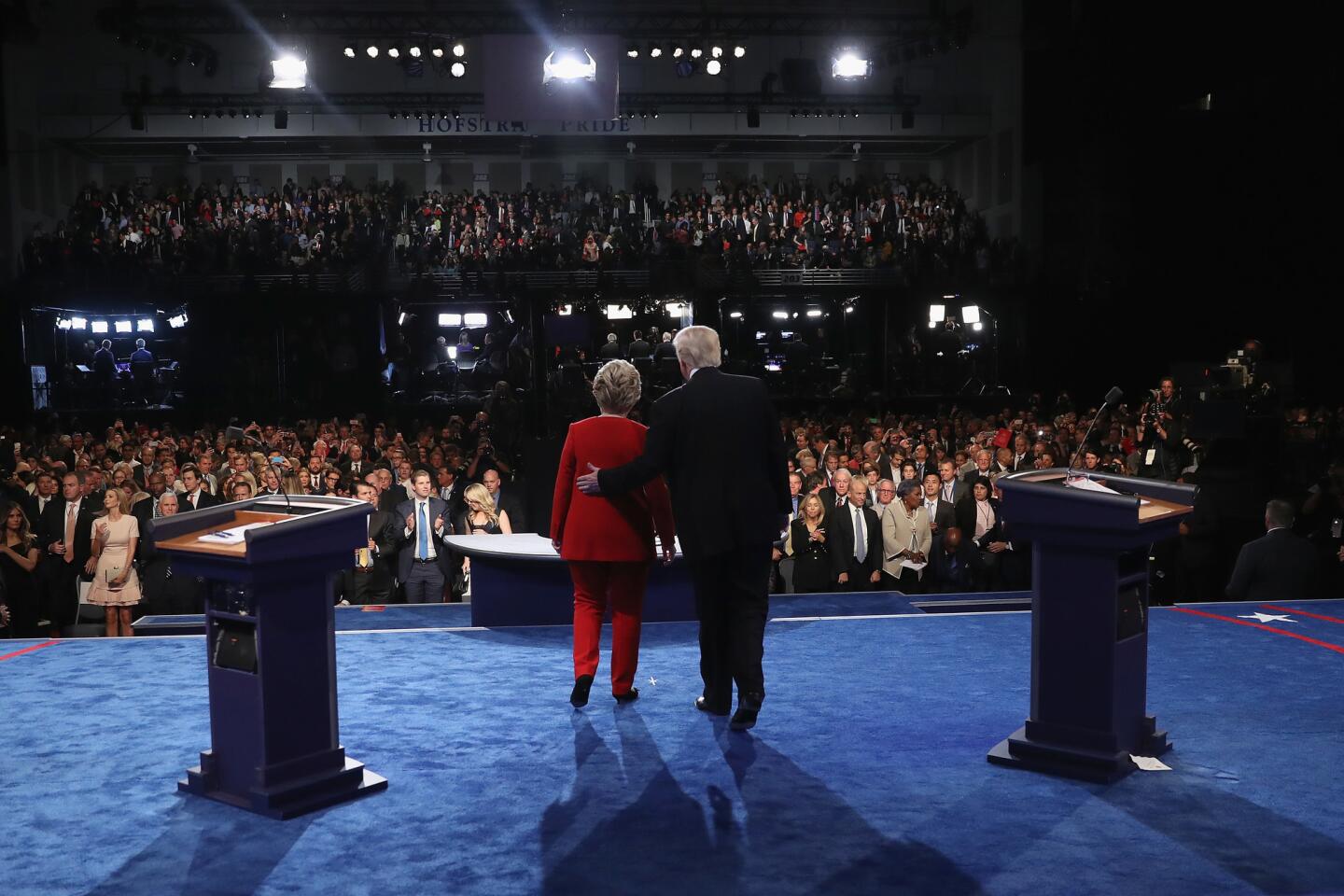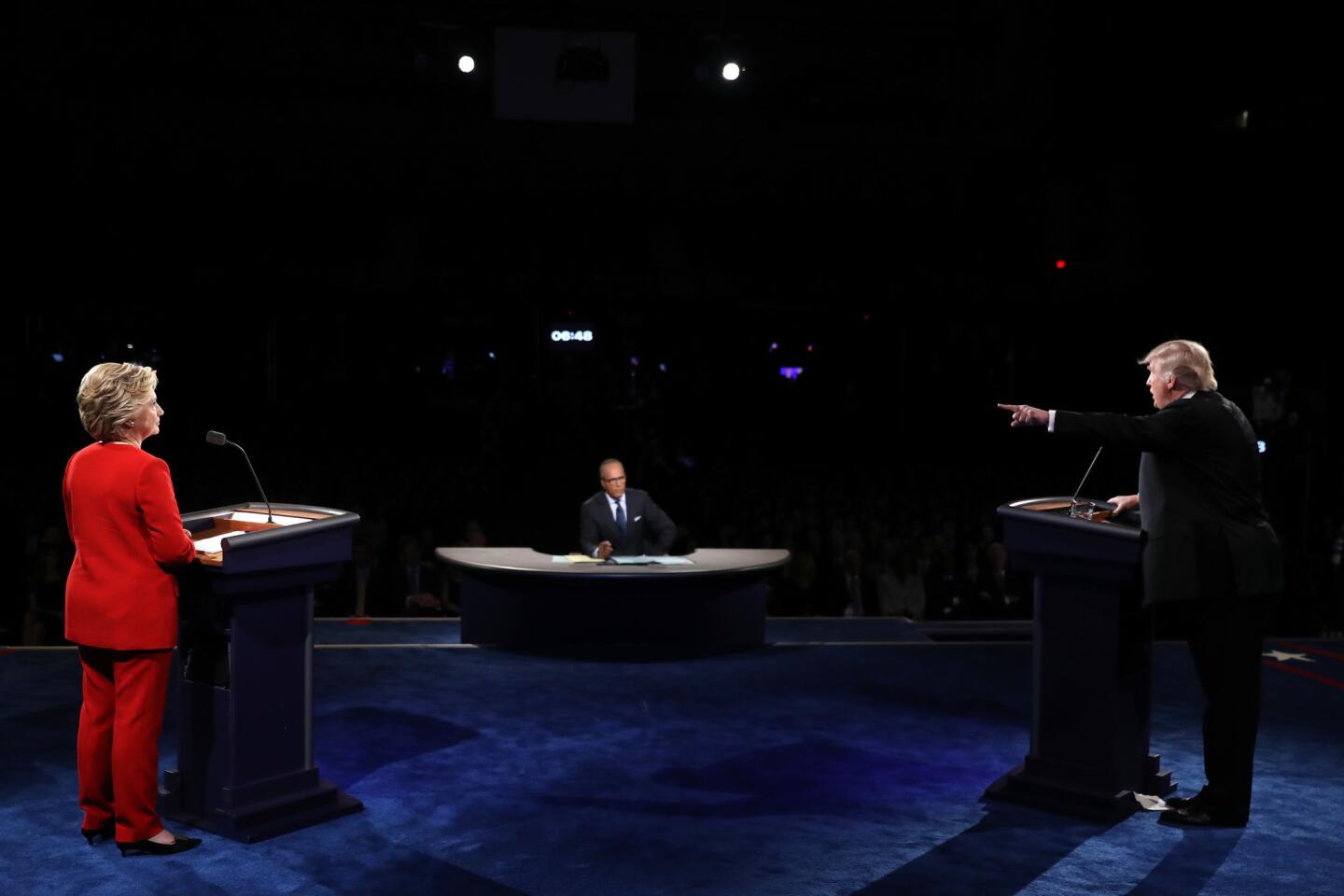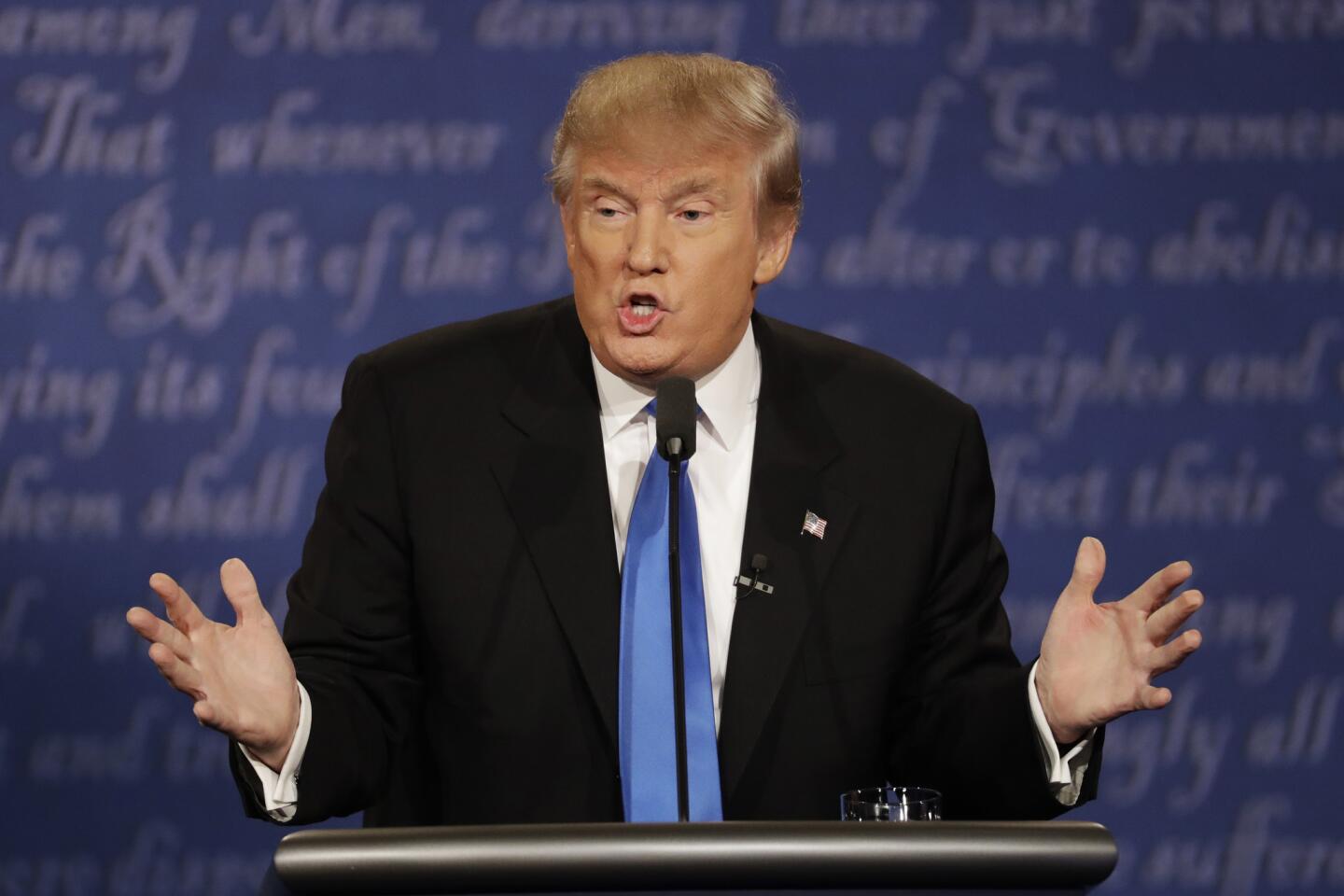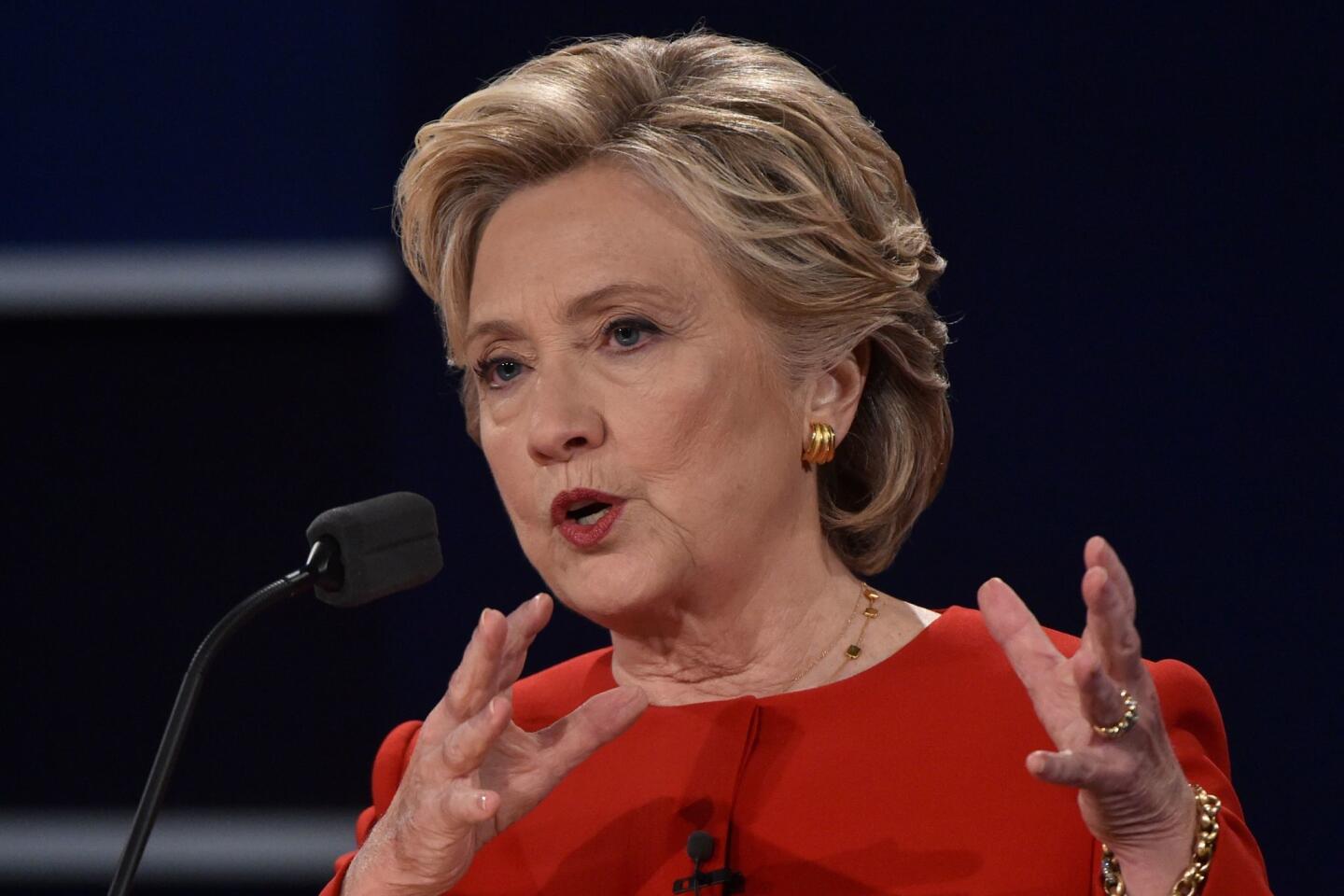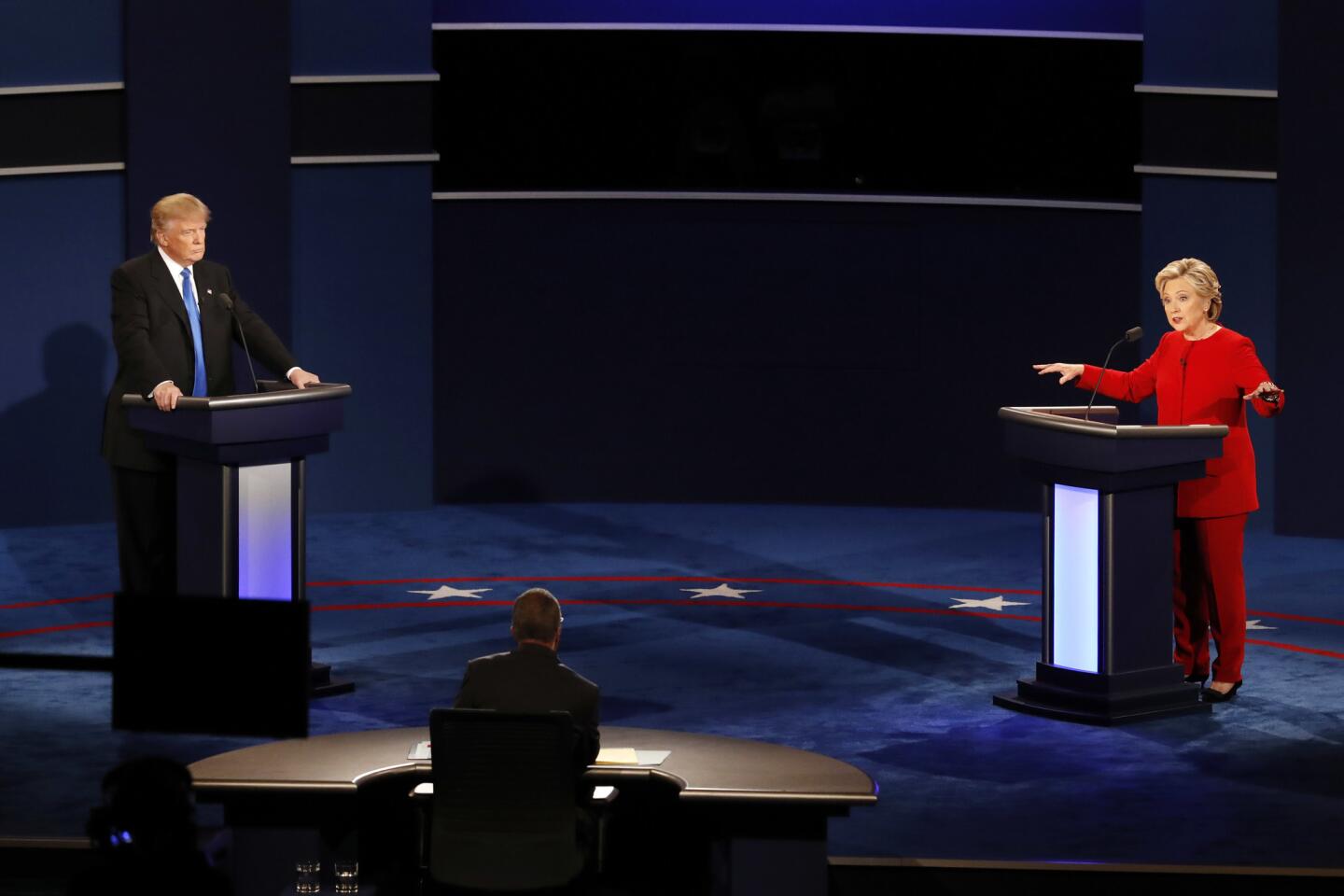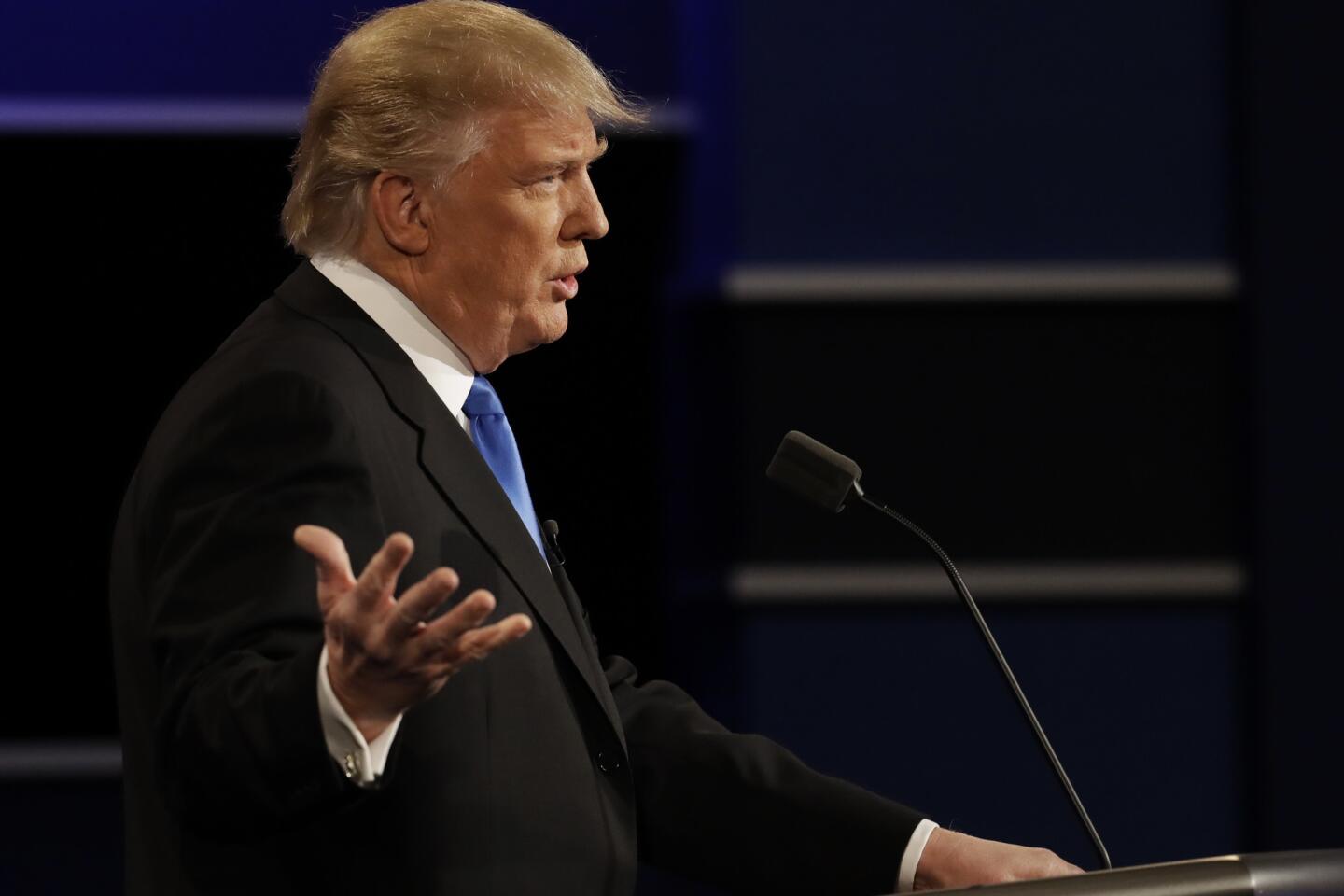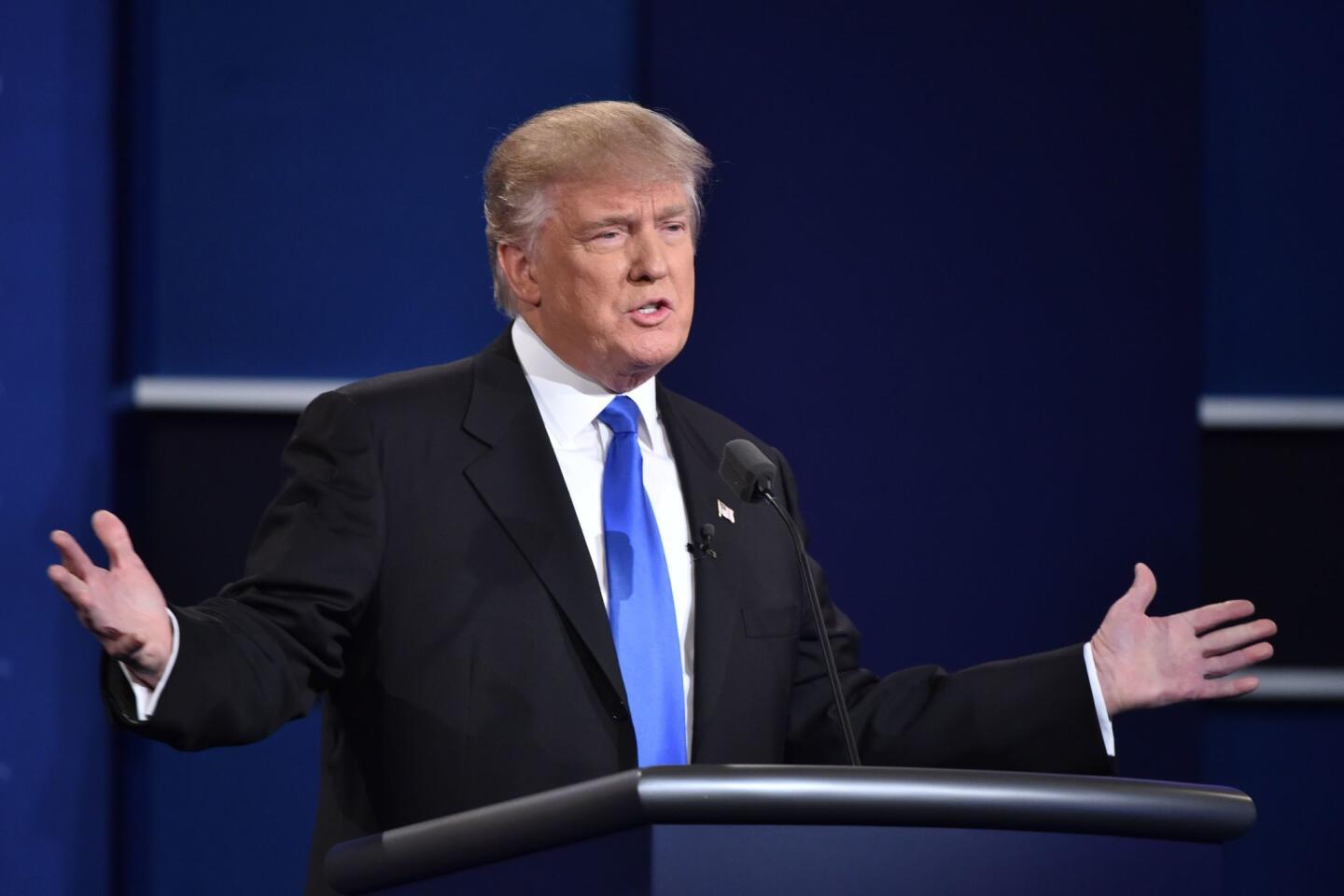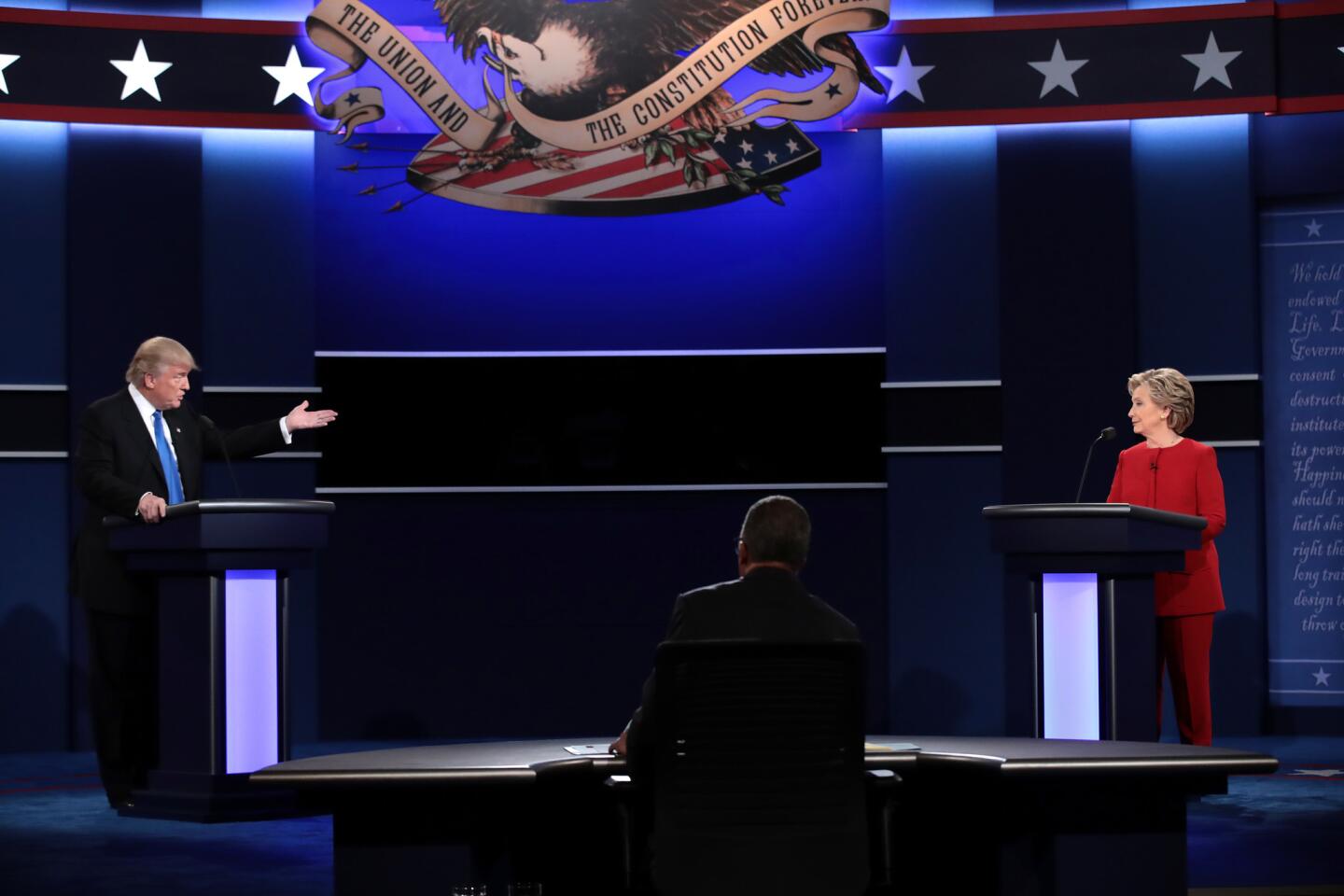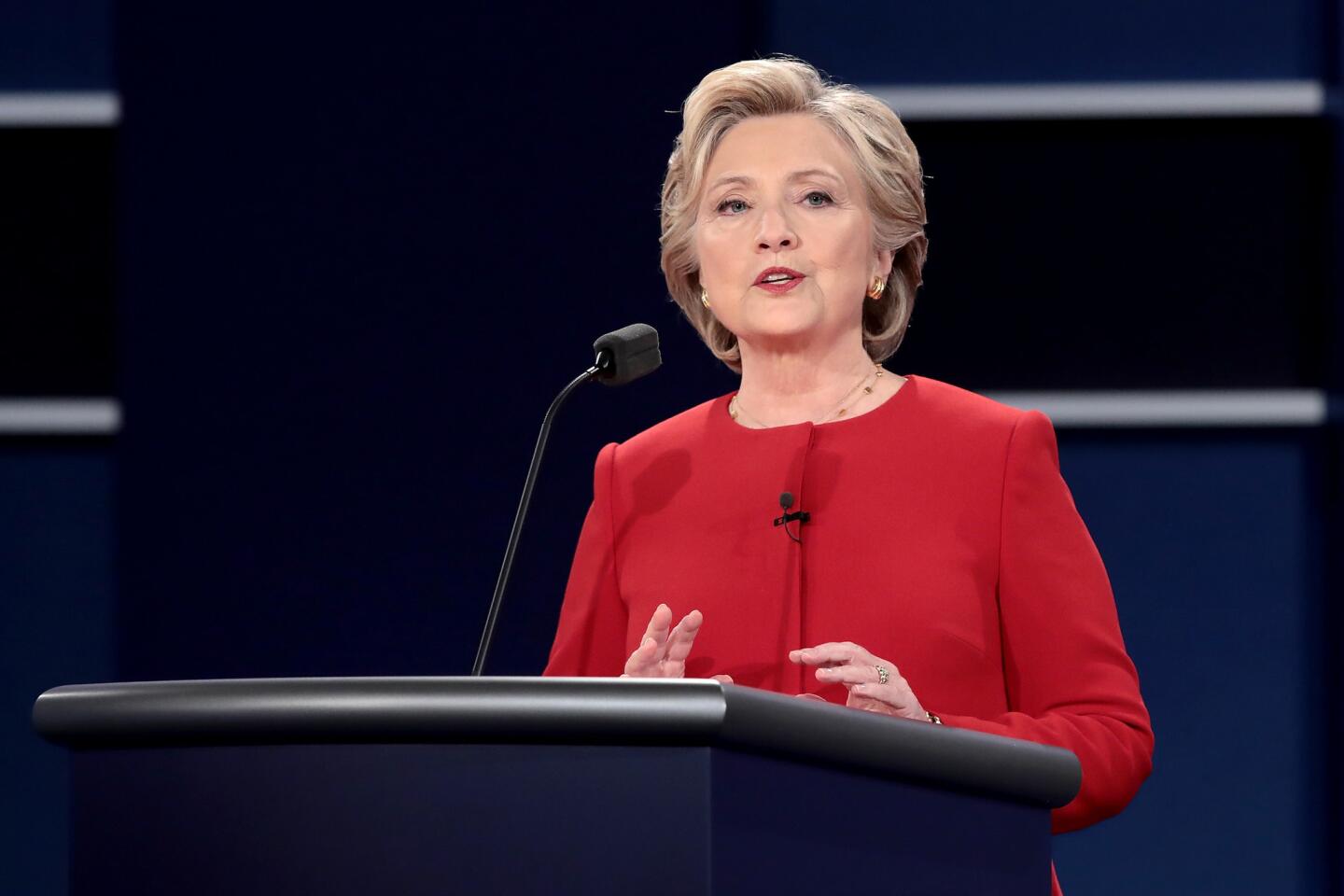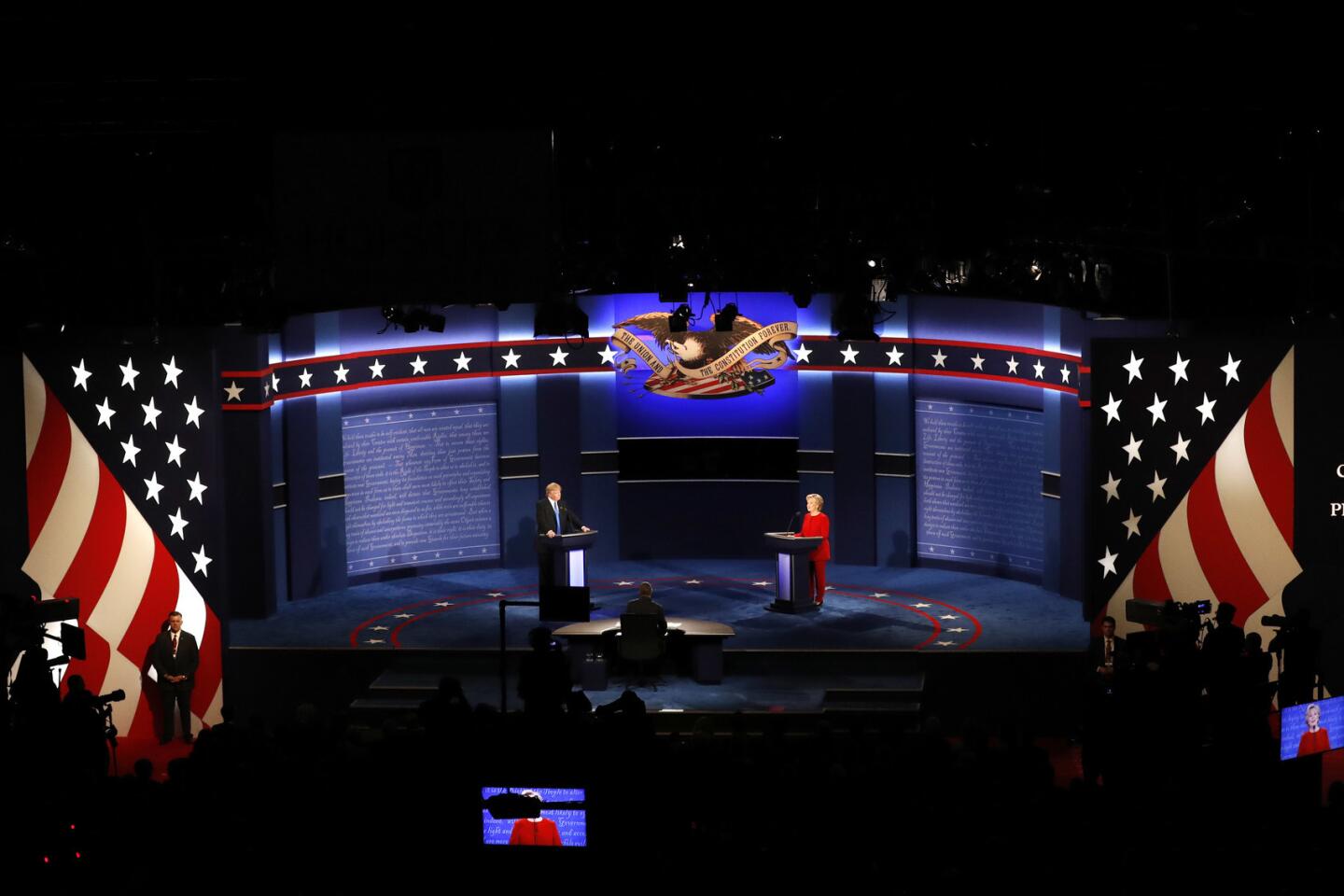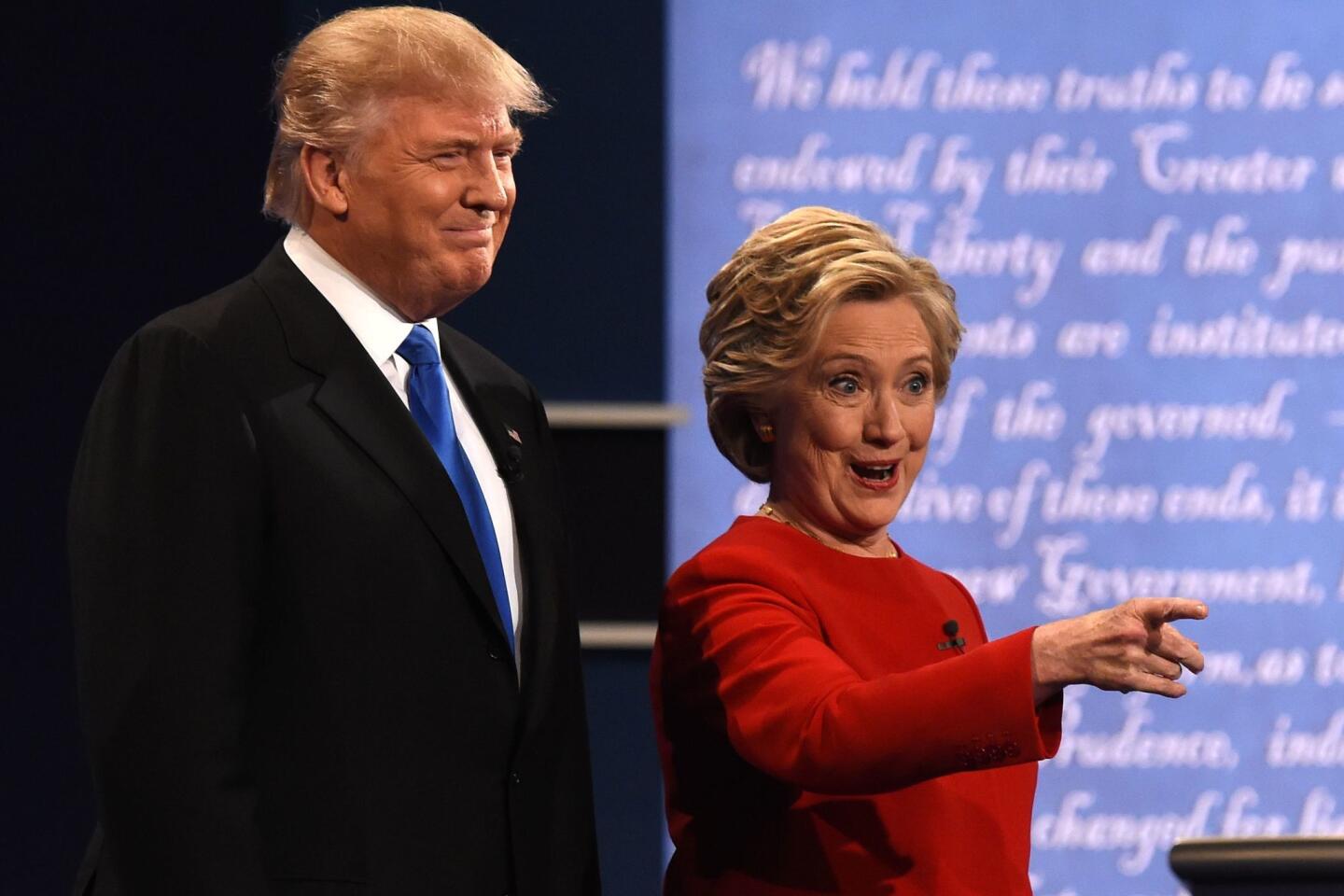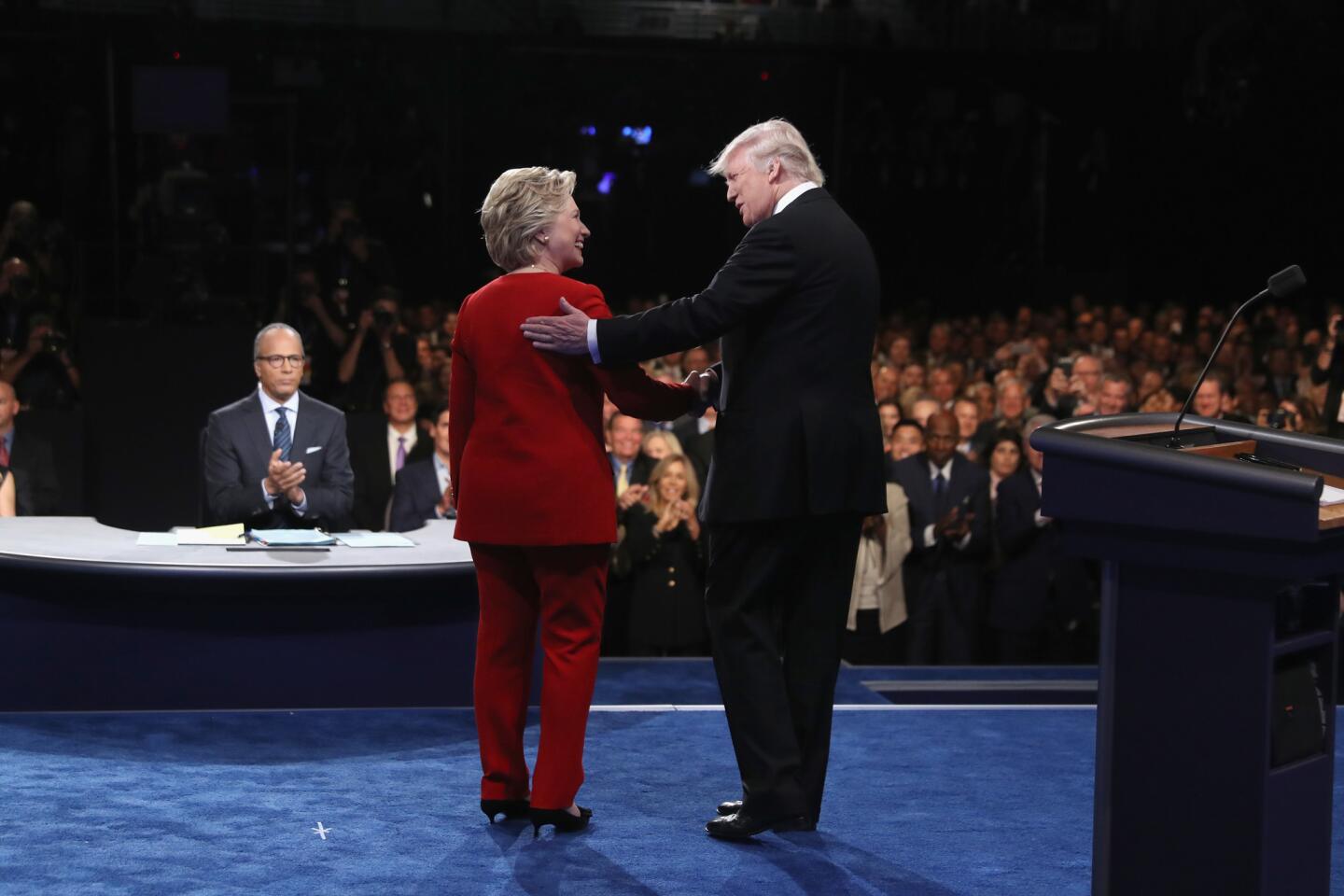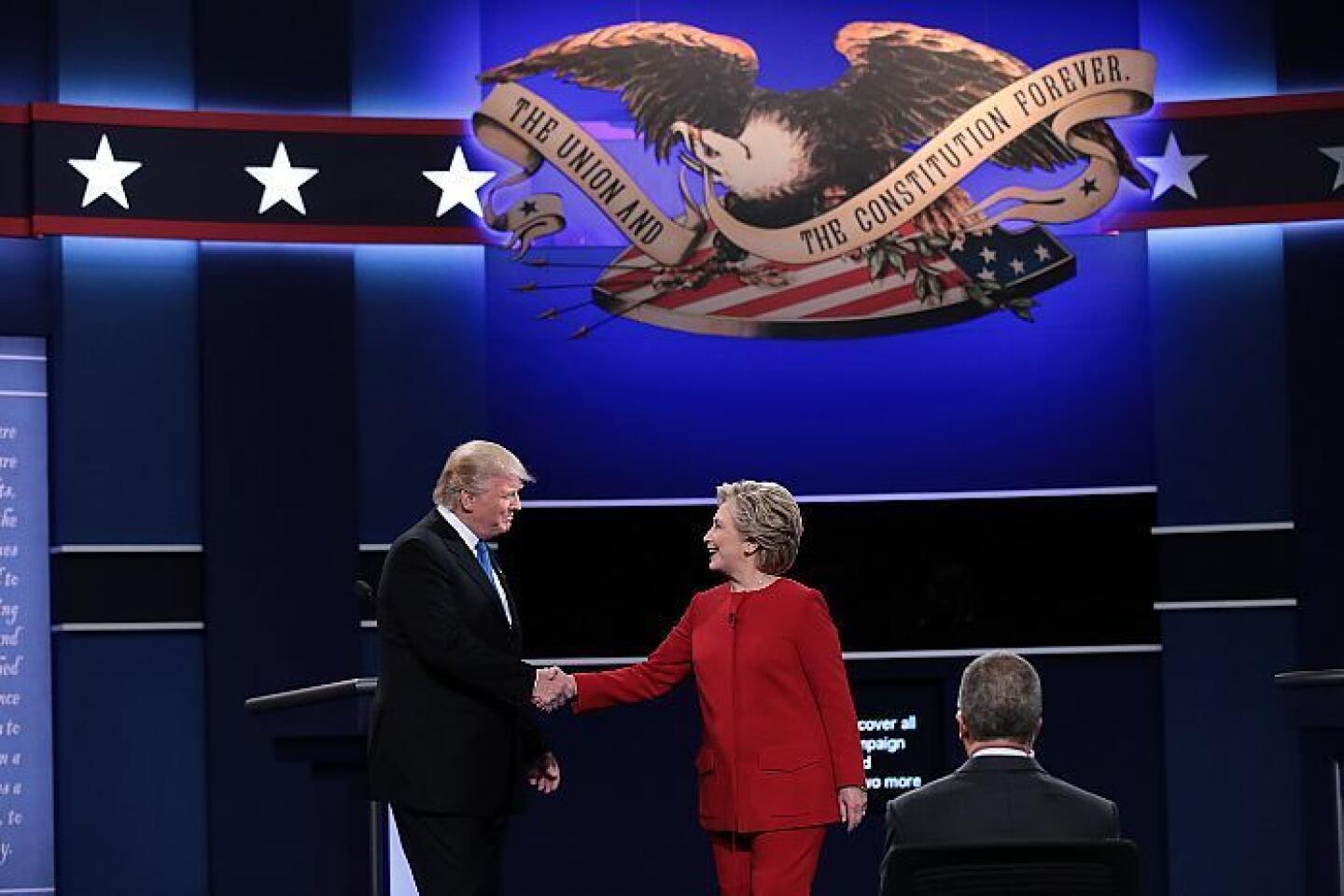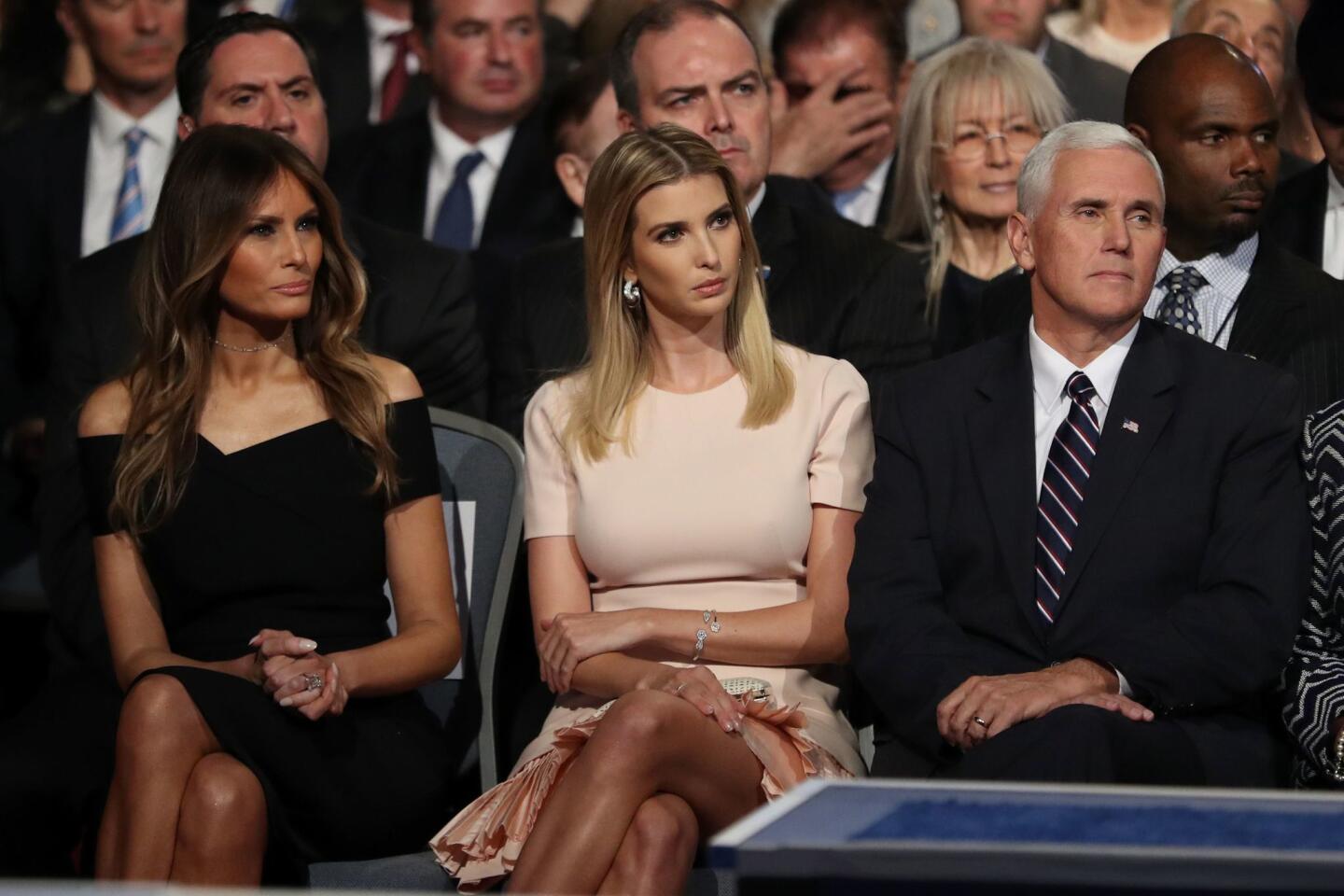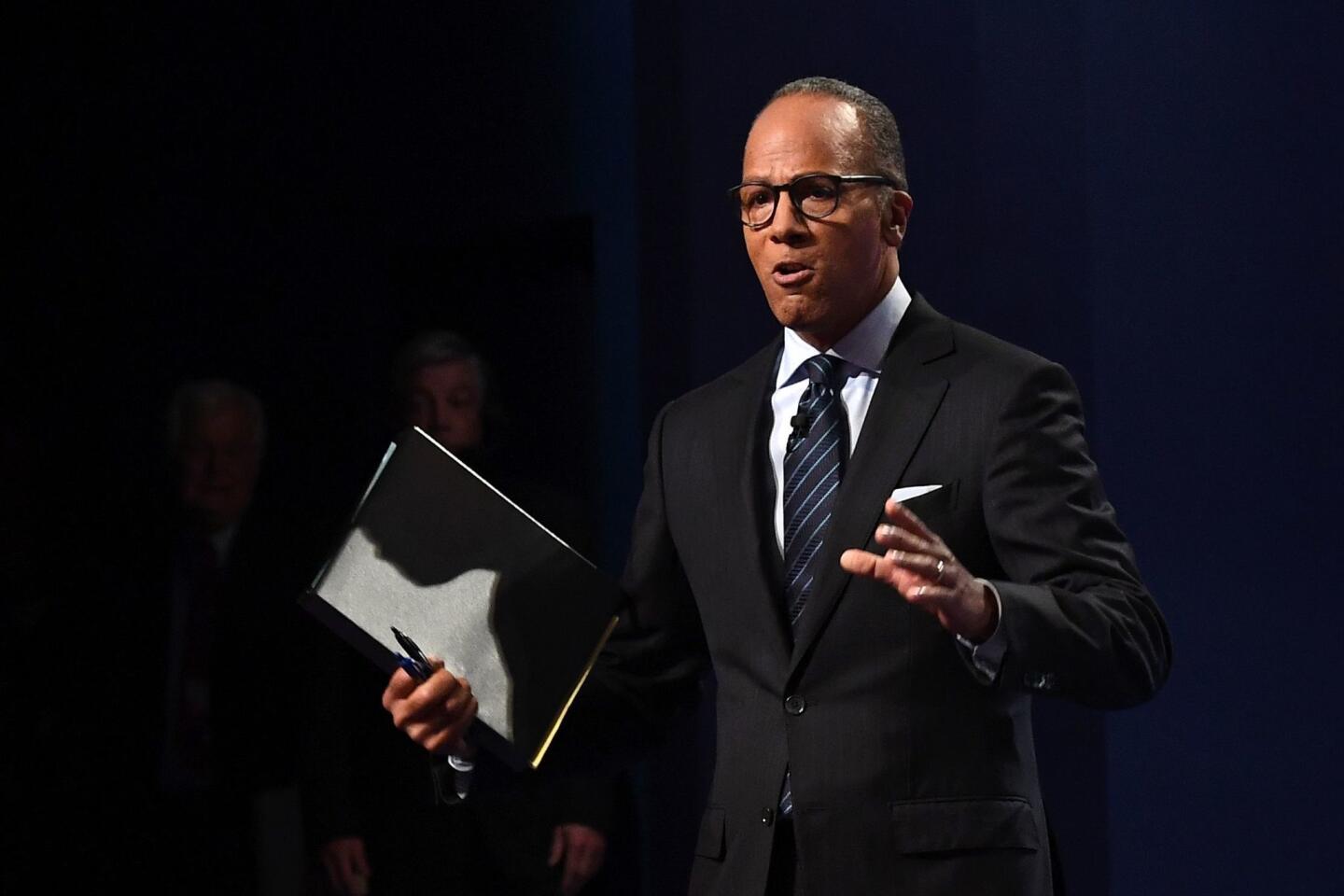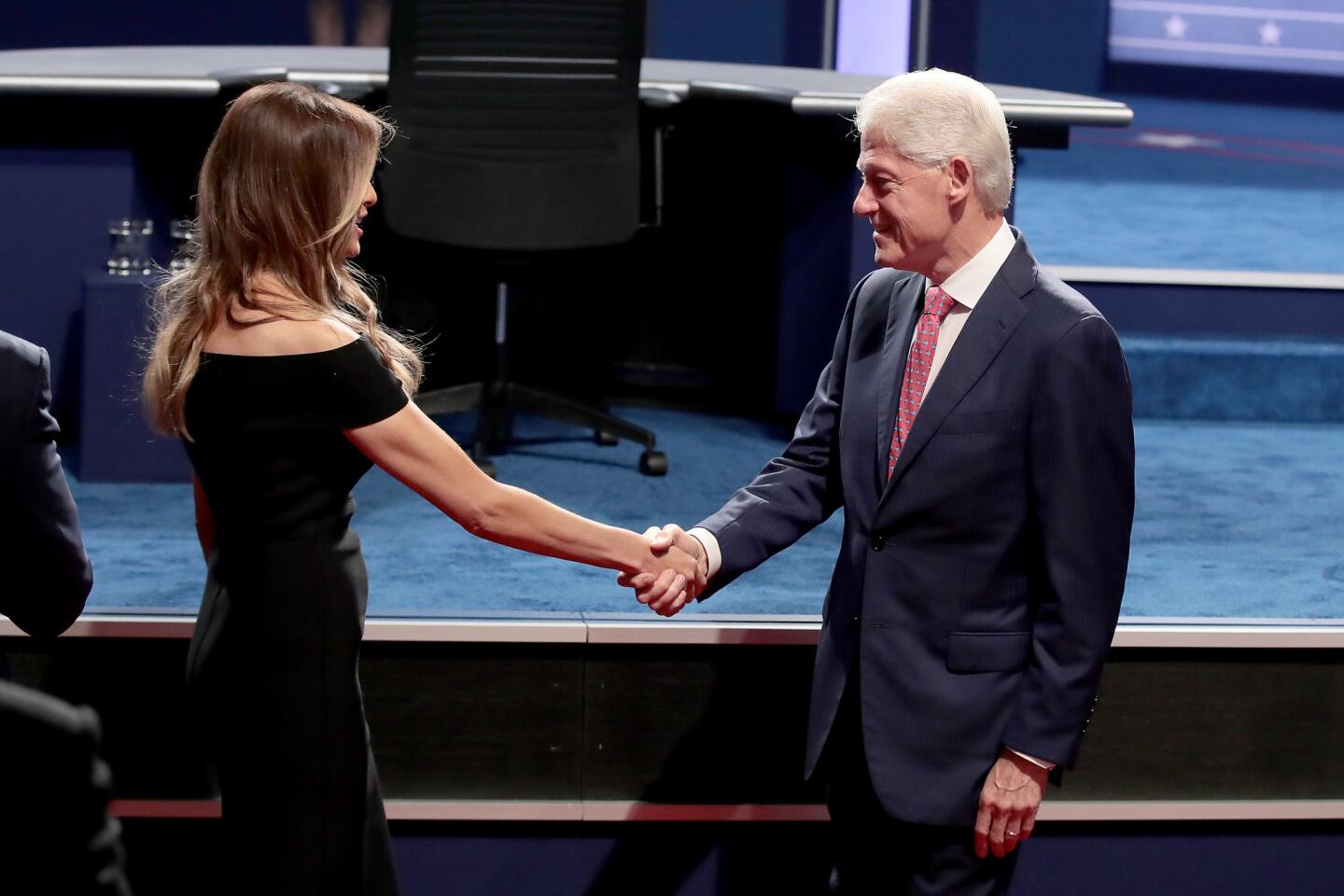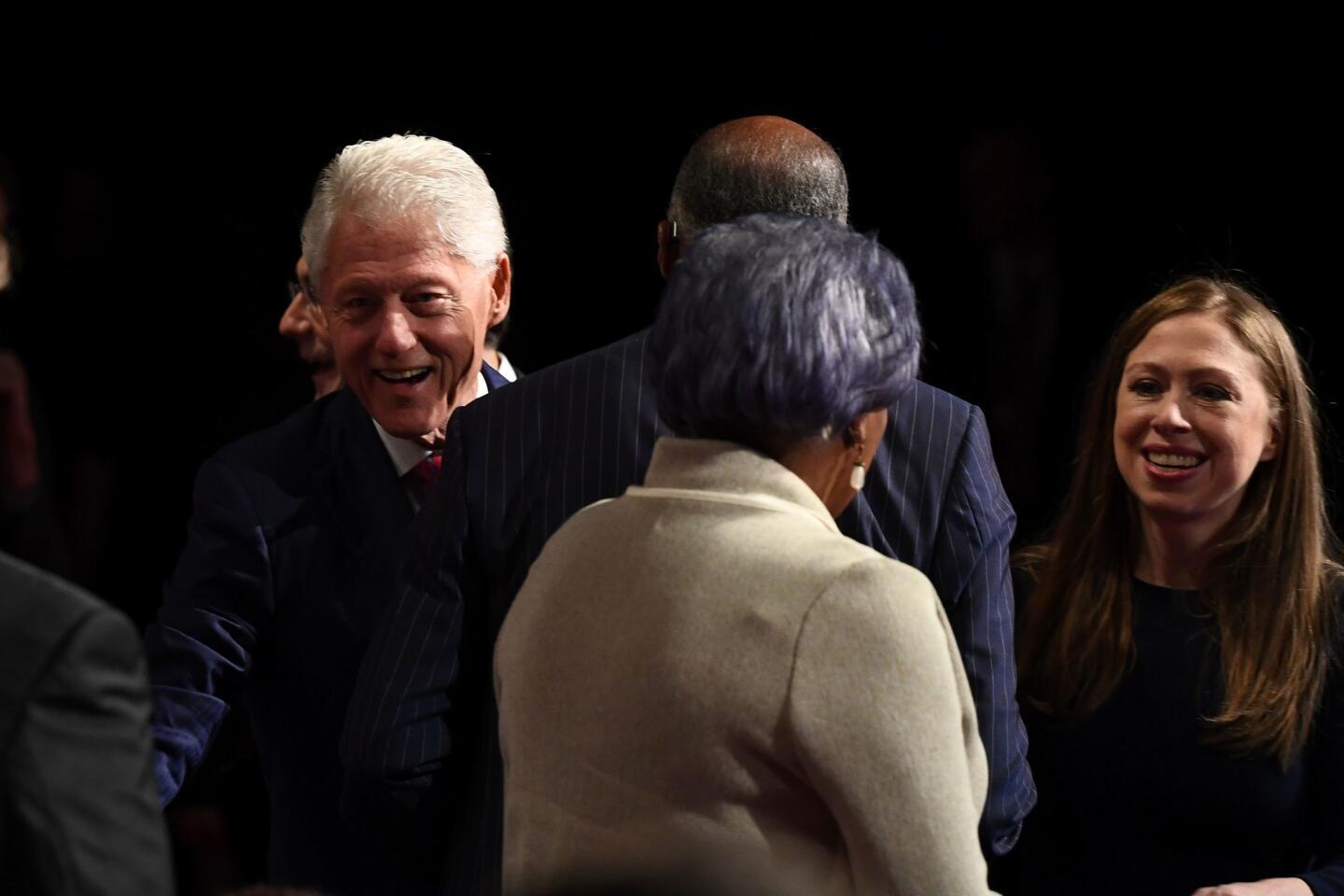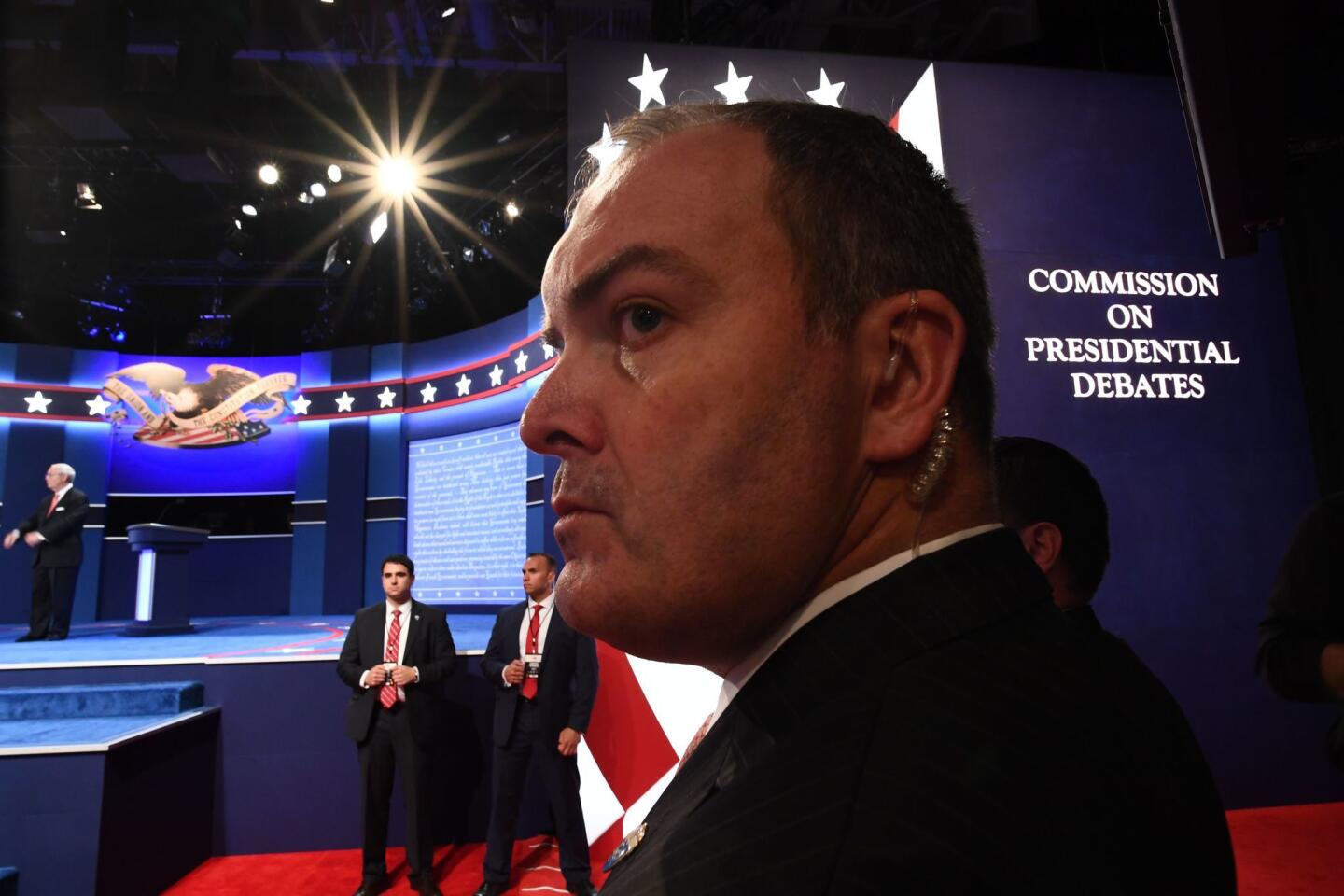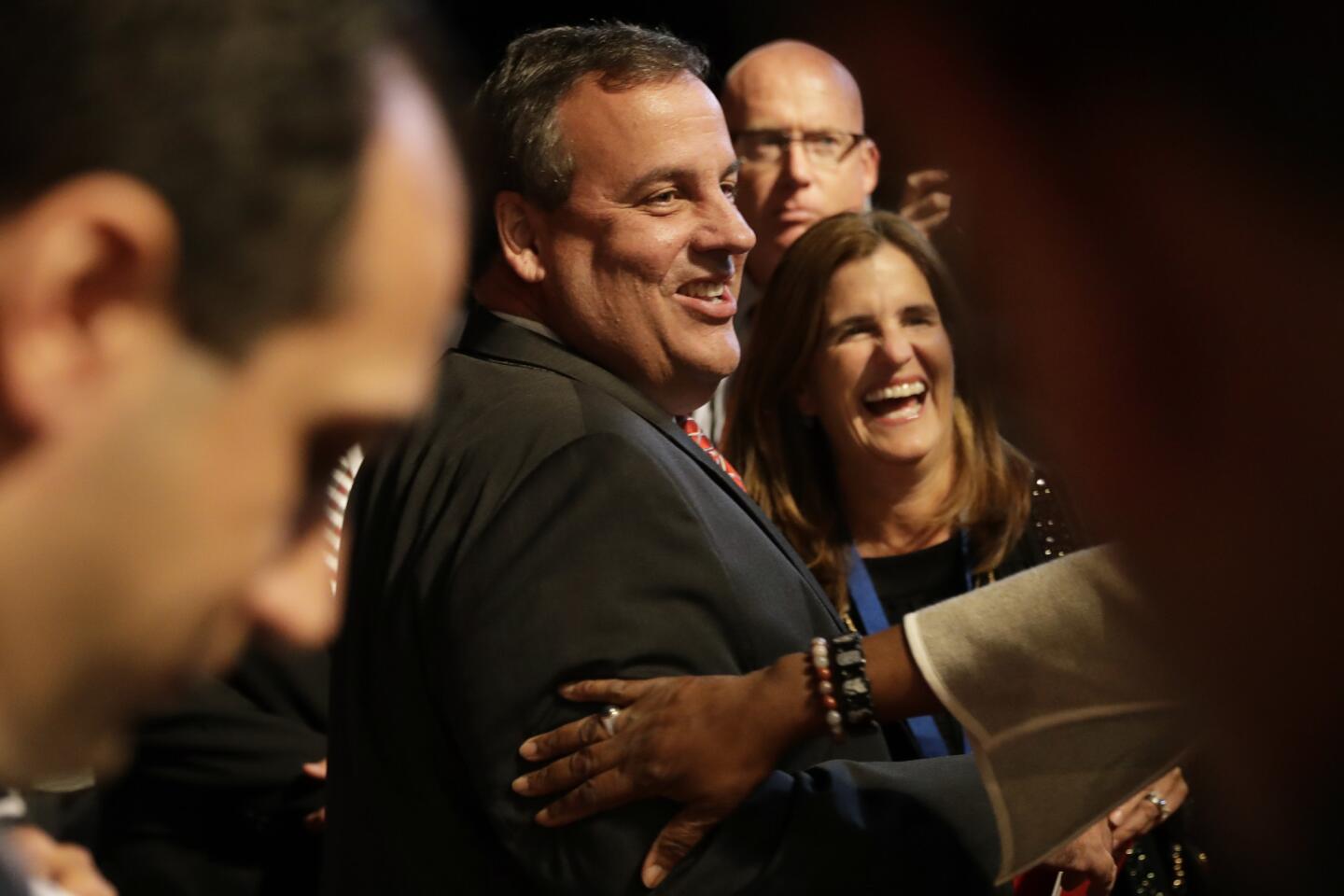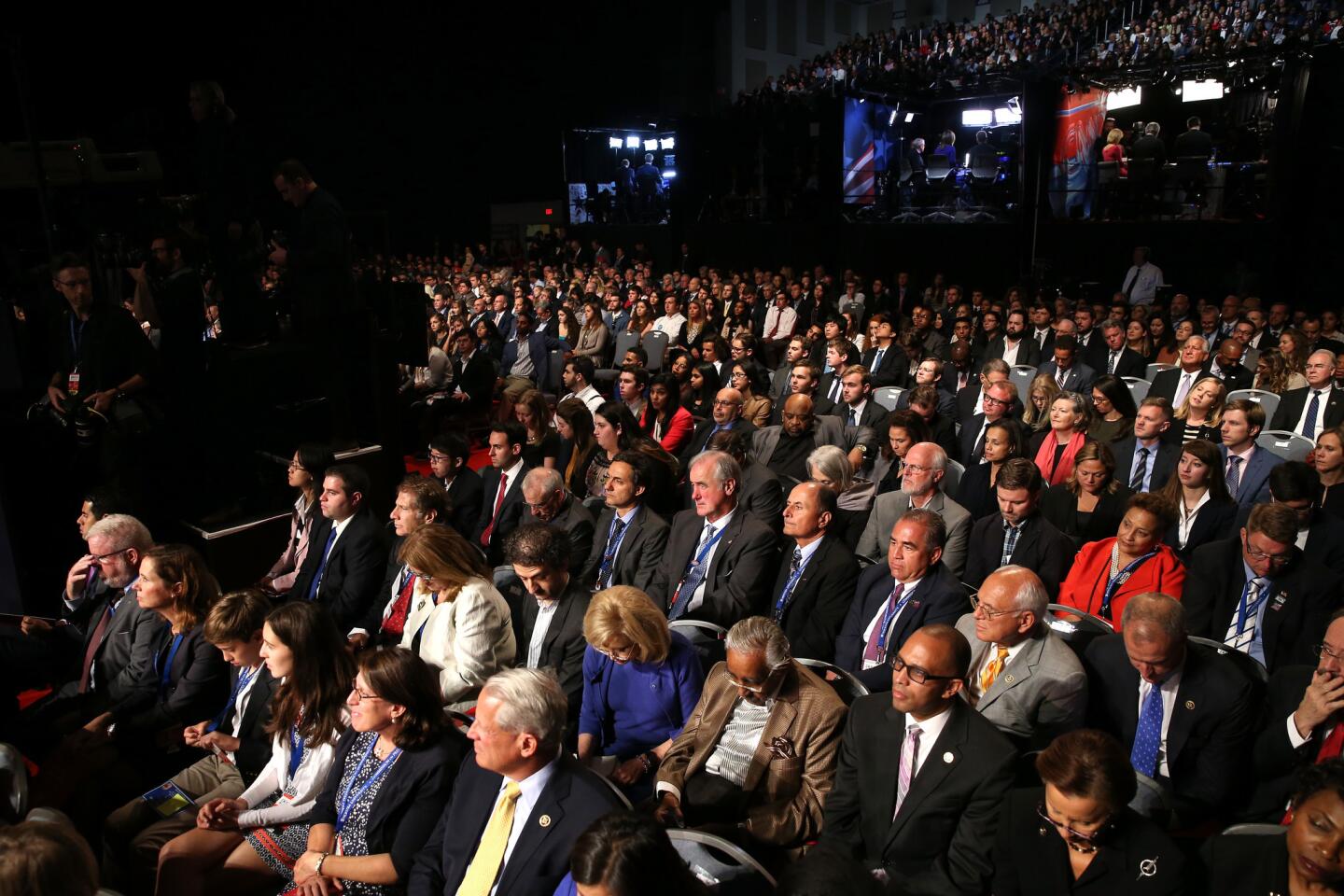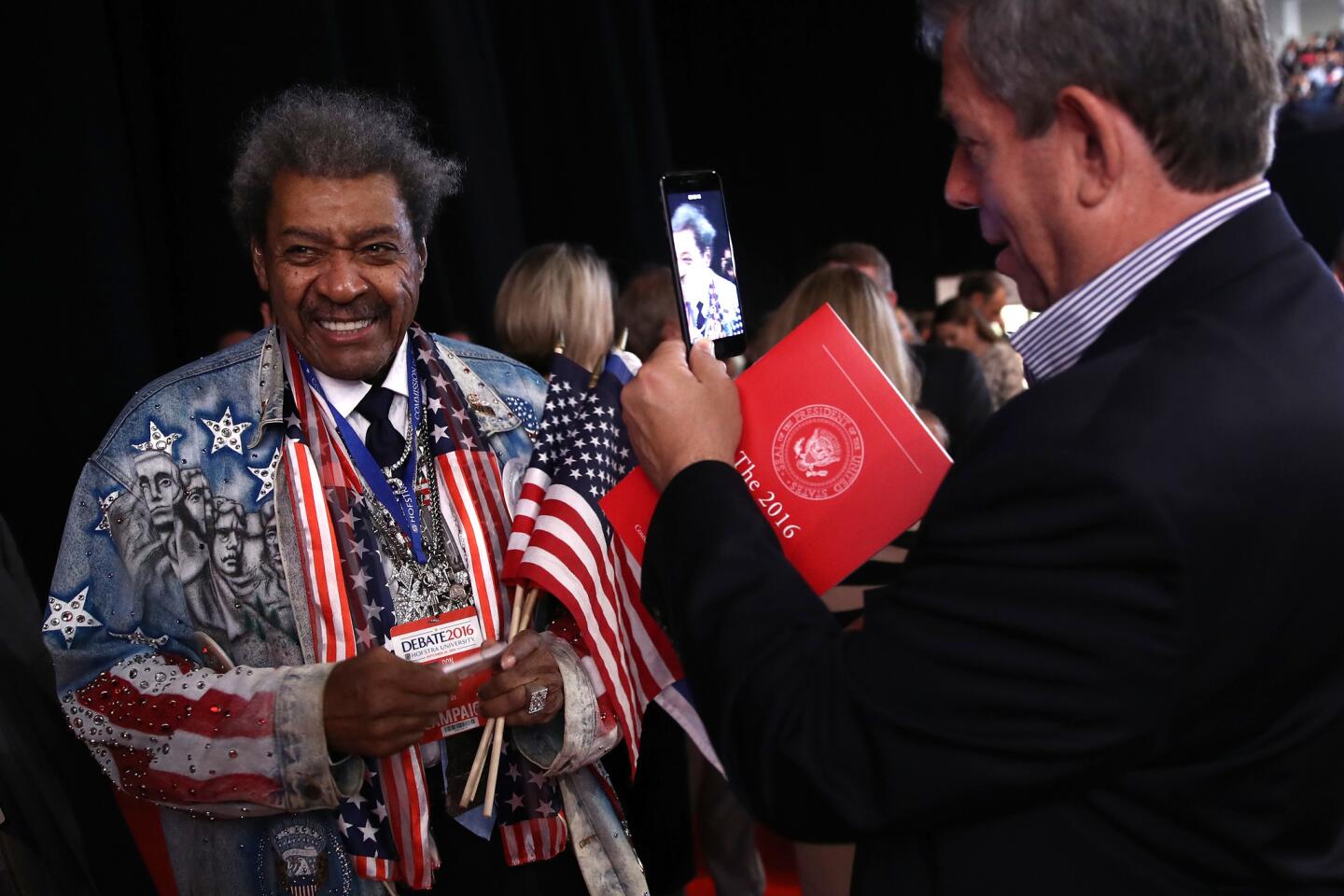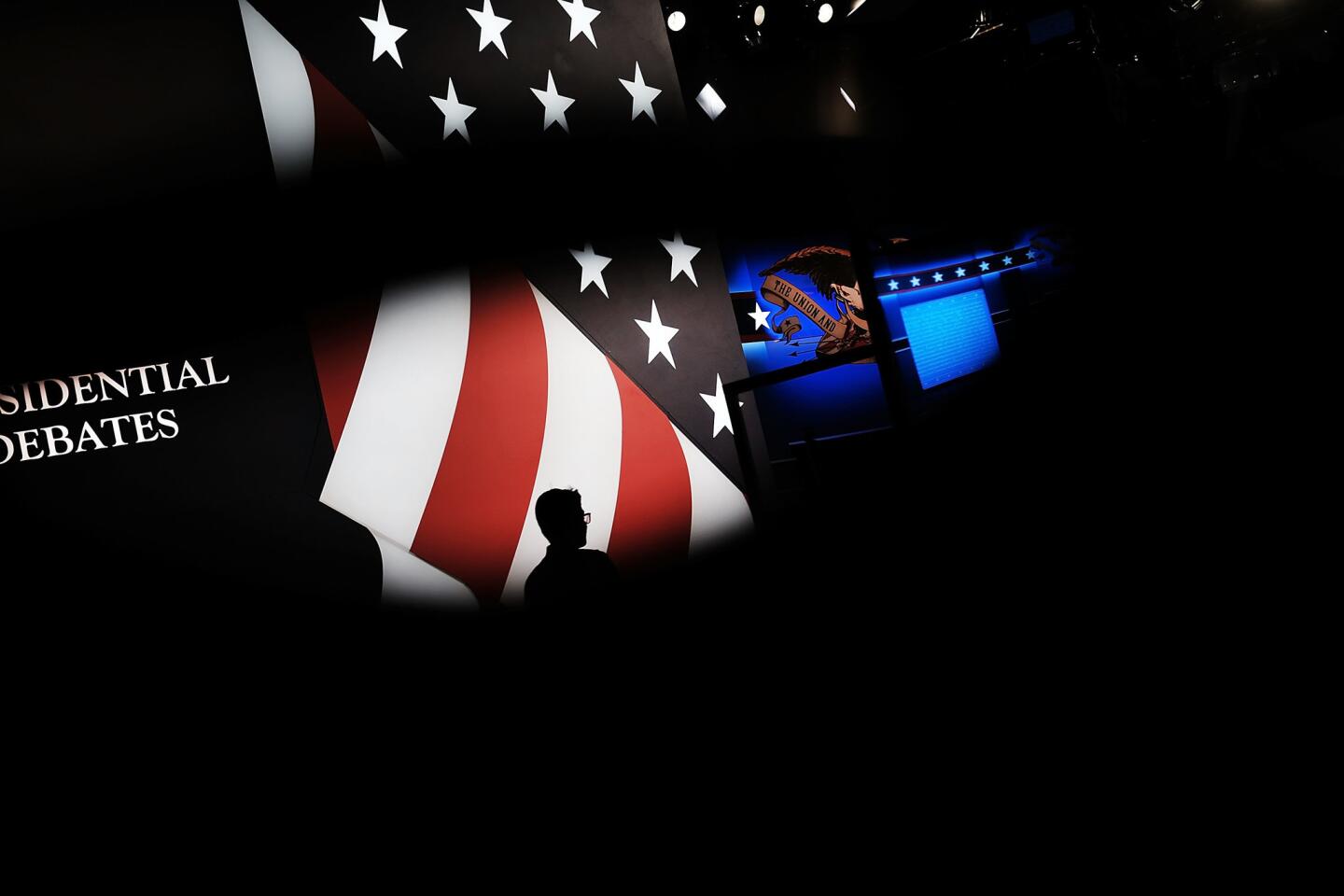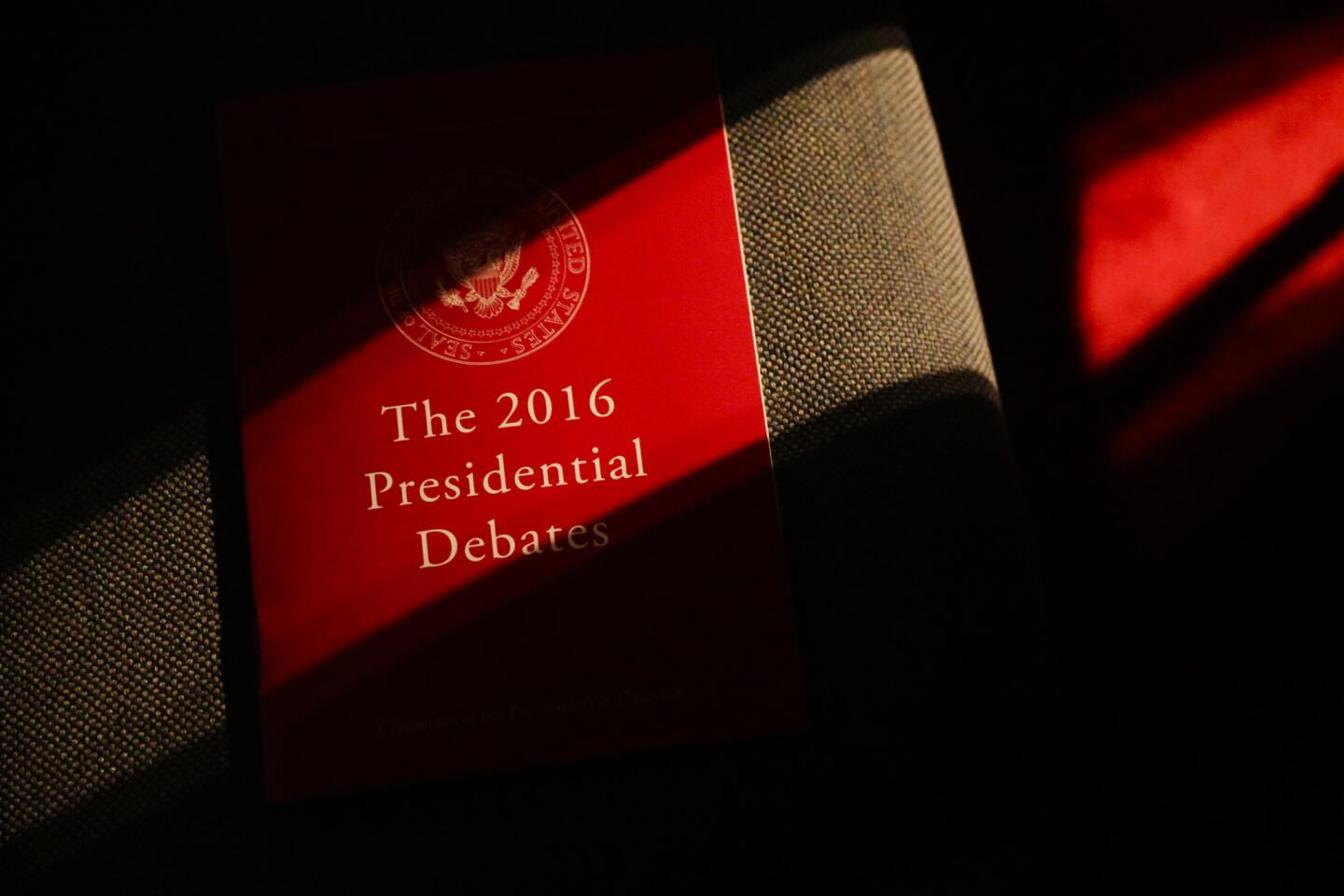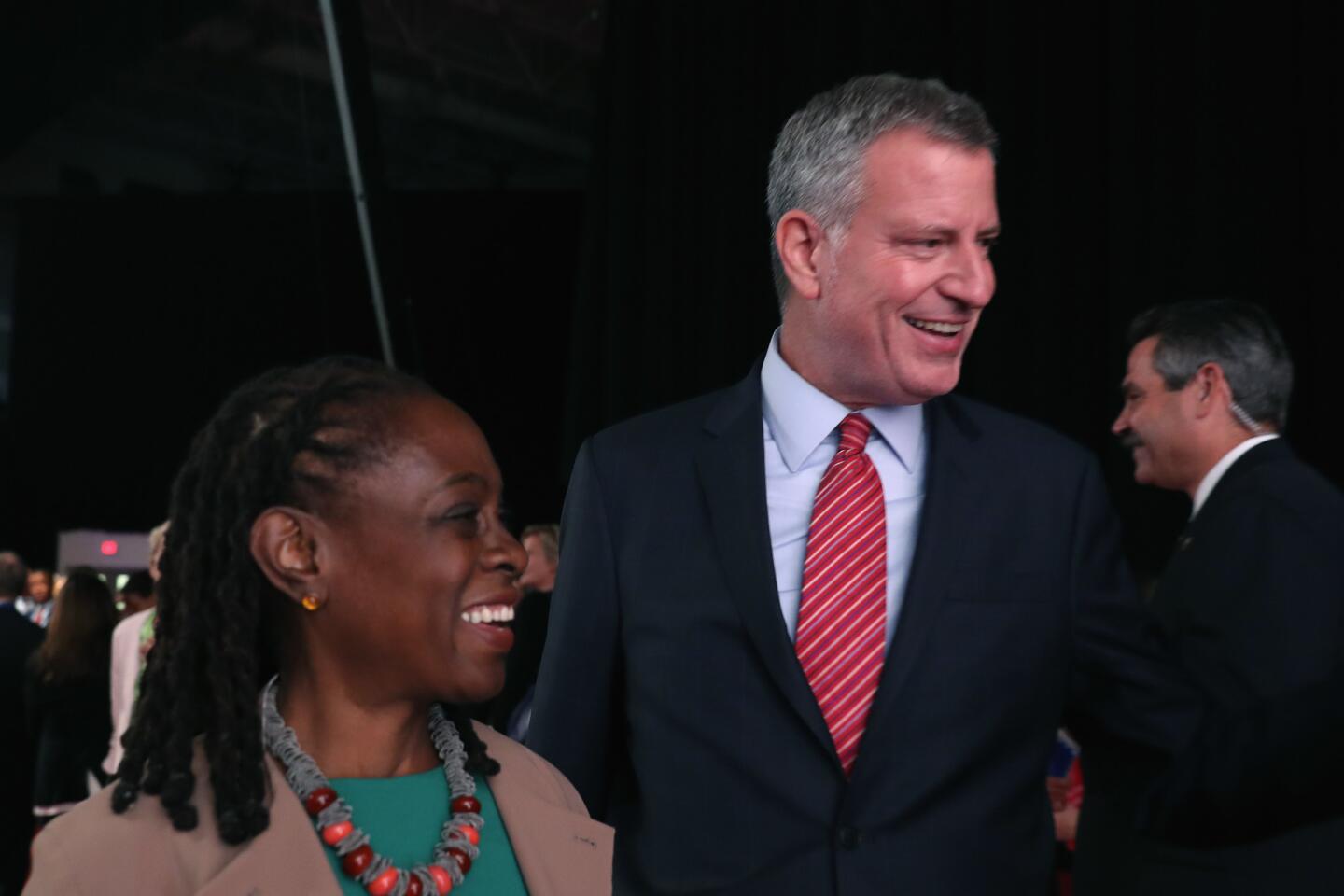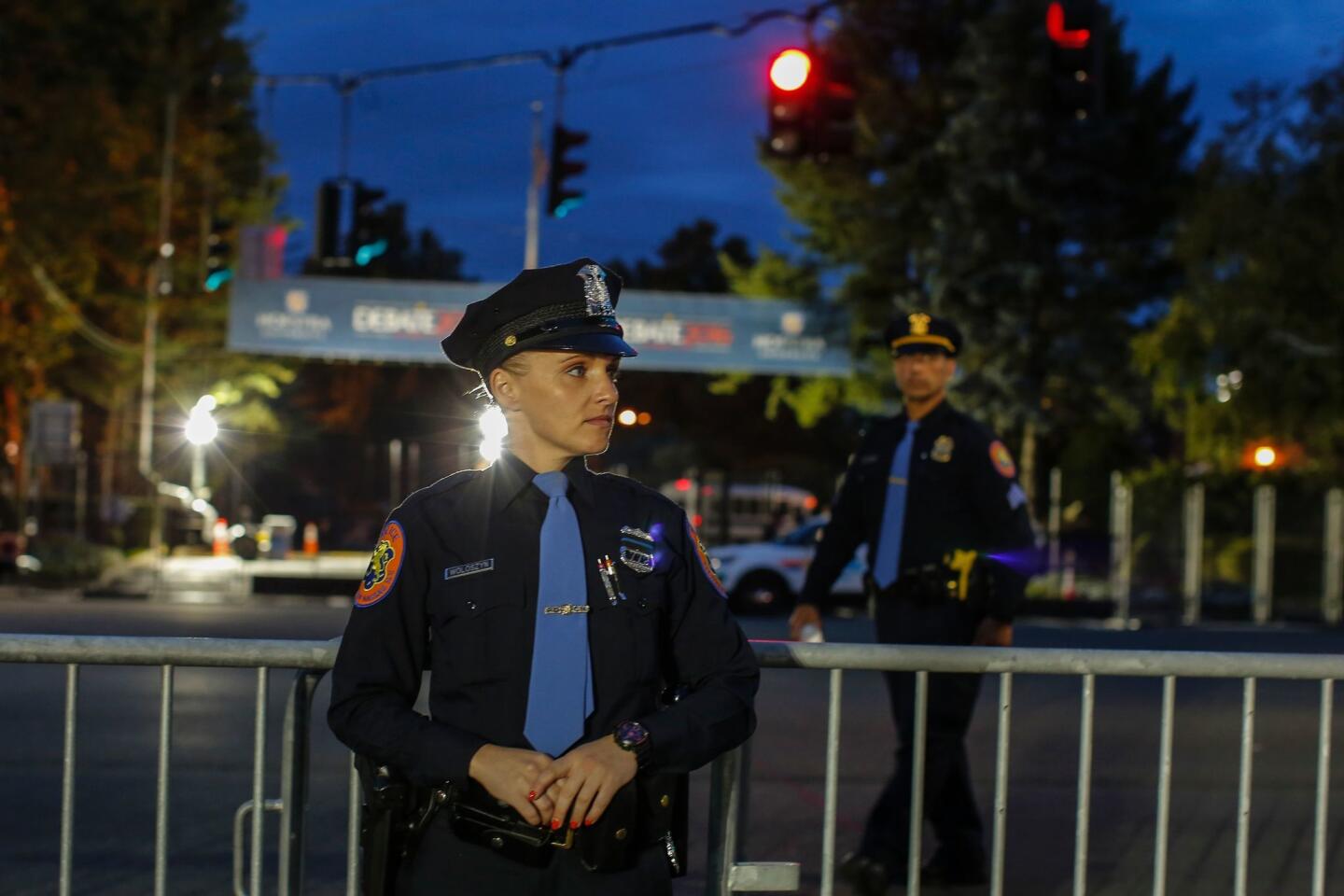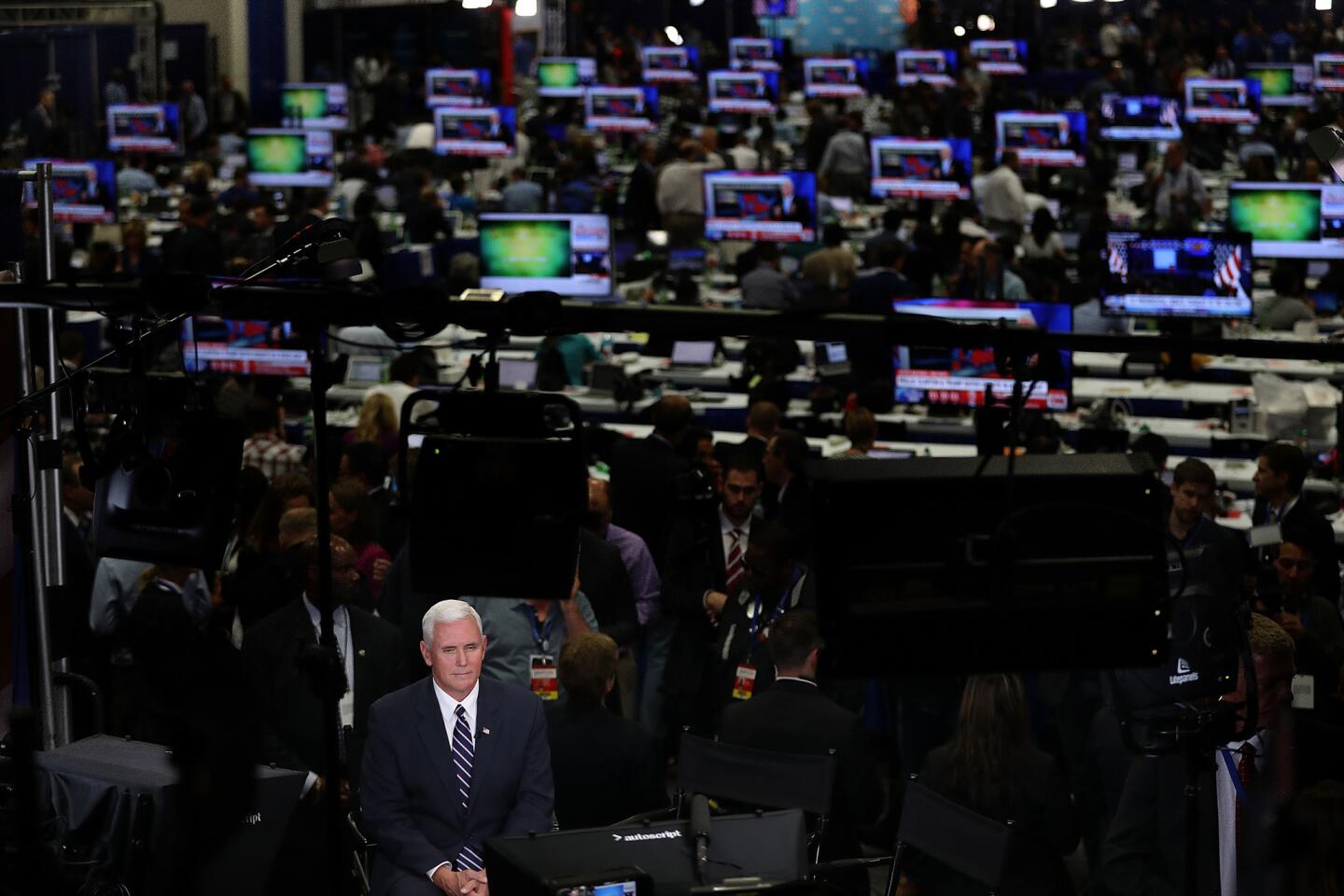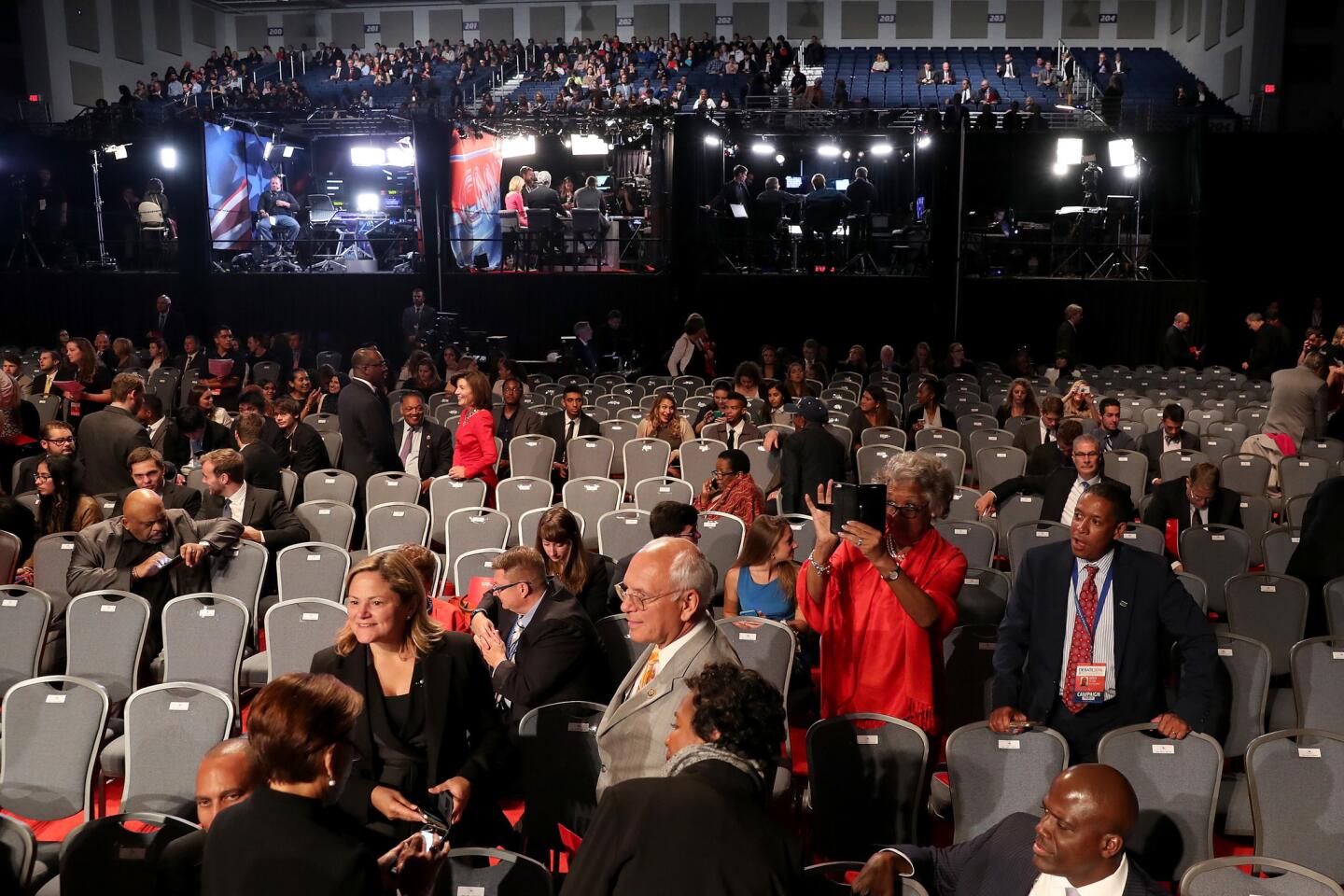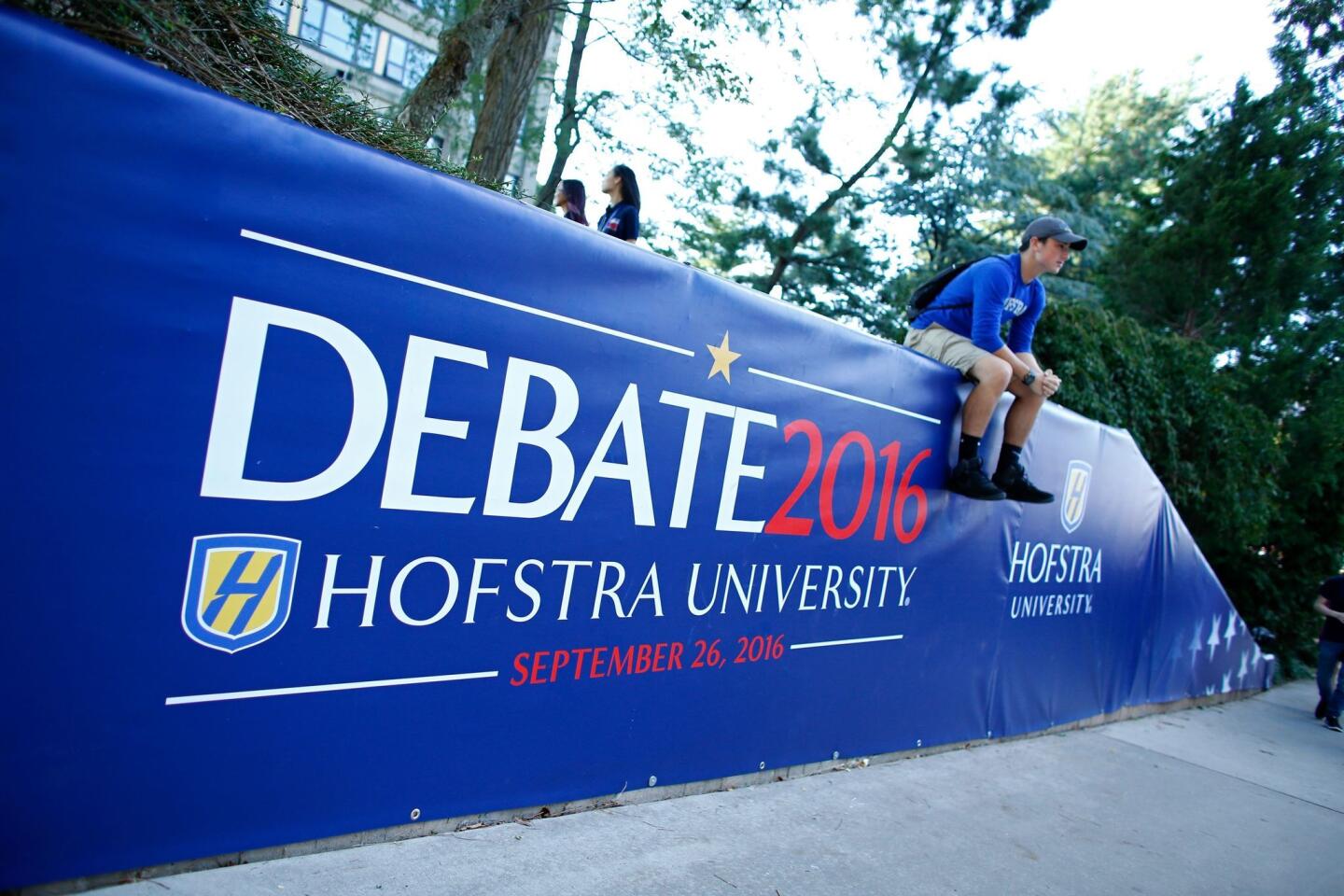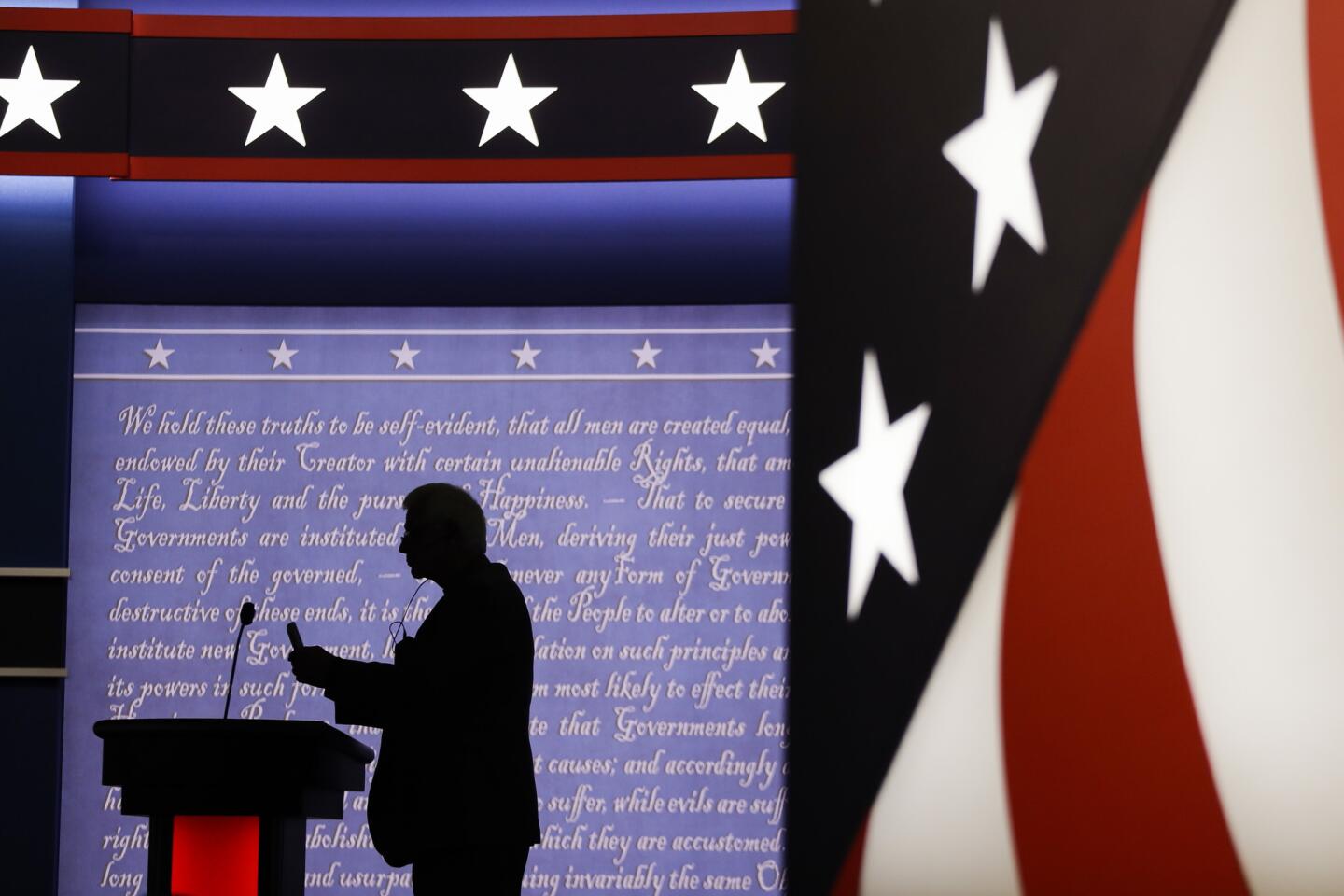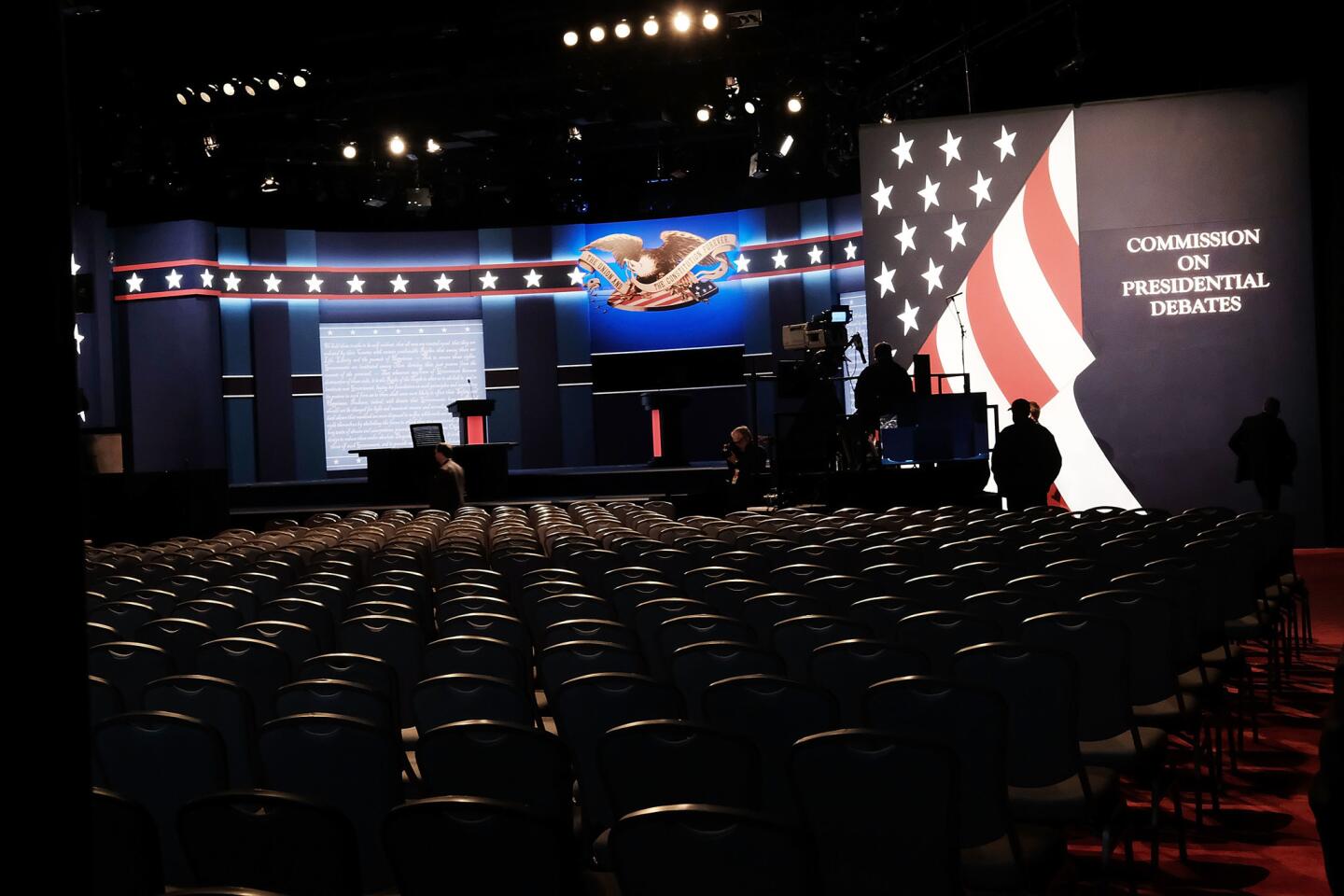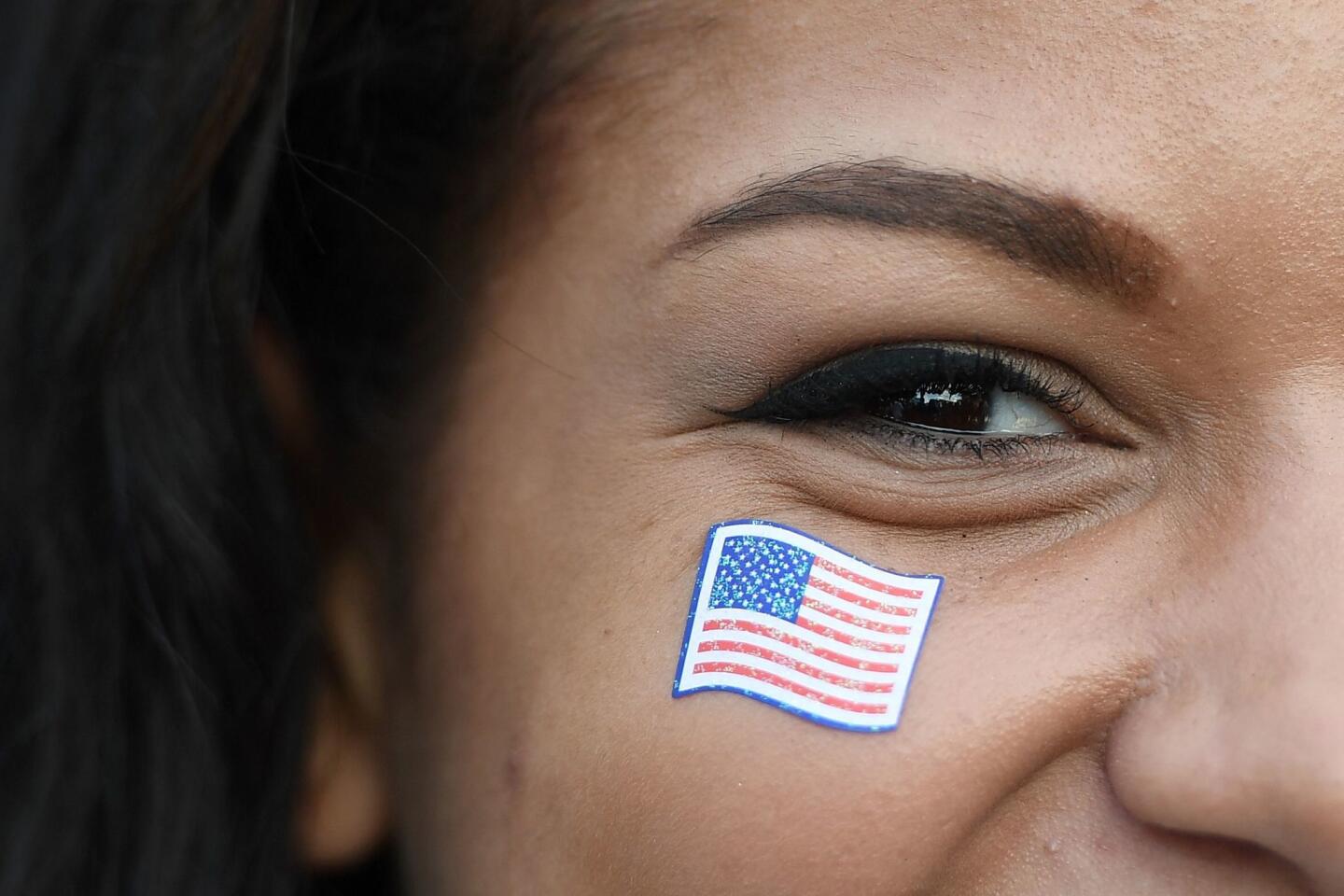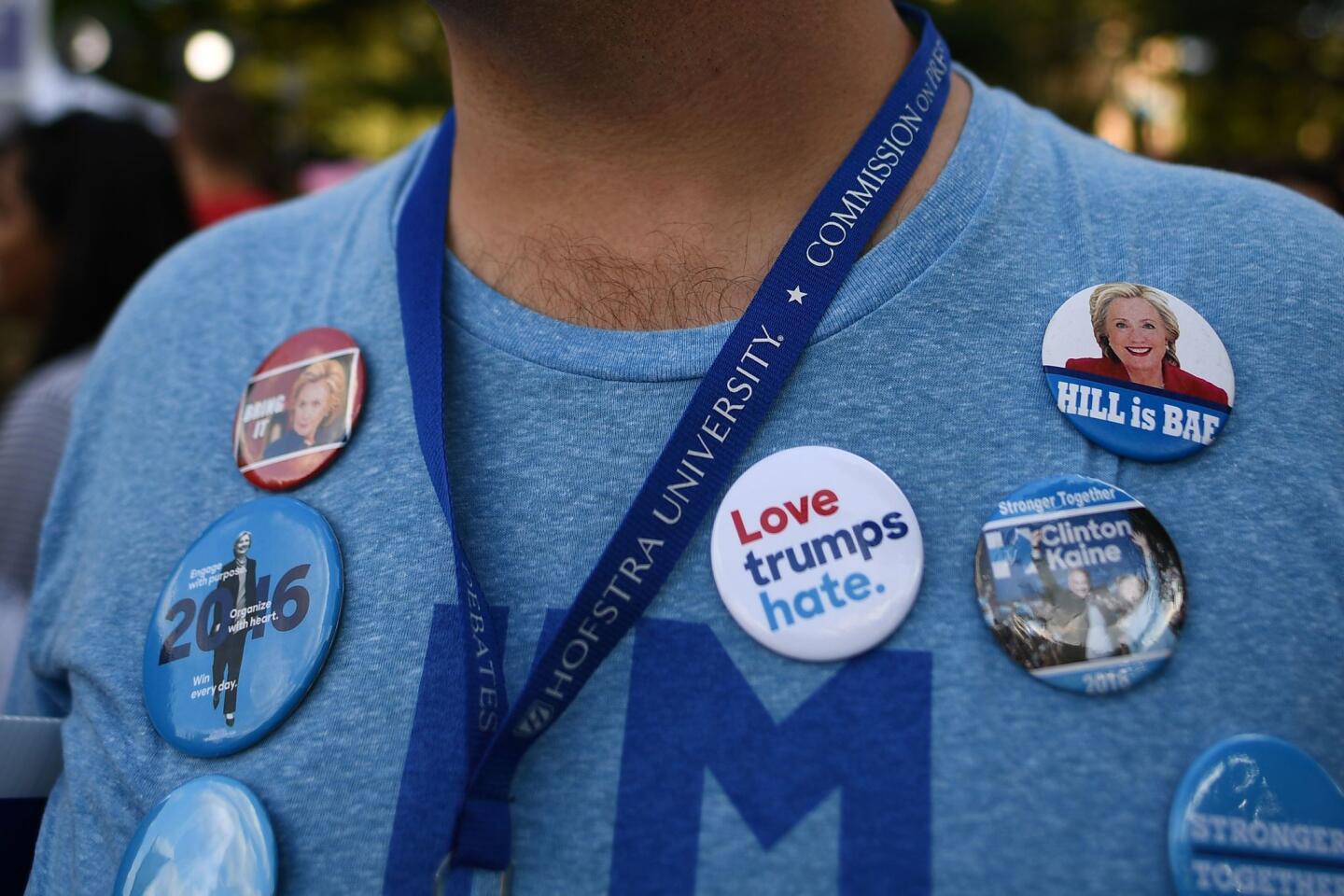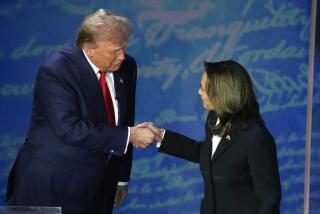Clinton and Trump clash over their pasts and their plans in ferocious opening presidential debate
- Share via
Reporting from Hempstead, N.Y. — Hillary Clinton accused Donald Trump of self-dealing and racism and he attacked her long political record as empty and ineffectual as the two rivals bared their deep personal dislike Monday in a slashing and sharply pointed first presidential debate.
The two differed — among many issues — over taxes, the state of the economy and how to mend the country’s fraught race relations.
Mostly they clashed over the virtues of a career spent in public service, as Clinton has done, versus the role of a political neophyte, like Trump, who has devoted himself to building a personal real estate fortune and fame as a reality TV star.
Clinton accused Trump of favoring massive tax cuts for the well-to-do, such as himself, in a return to the kind of trickle-down economics that led to the Great Recession.
“I call it Trumped-up trickle-down,” she said, suggesting his plan would add trillions of dollars to the national debt and pitch the economy back into recession.
Election 2016 | Live coverage on Trail Guide | Sign up for the newsletter | The race to 270
Trump asserted that she was wrong and said his plan would have a galvanizing effect, creating millions of good-paying jobs and contrasting that with Clinton’s “all-talk” approach to economic policy.
“Typical politician,” he scoffed.
The 90-minute session on the campus of Long Island’s Hofstra University was testy from the start. Within moments, the candidates began talking over each other as they argued about their past, their future plans and comments each has made over the course of the rancorous campaign.
In his eagerness to one-up Clinton, Trump made some unforced errors that Democrats were certain to jump on, including a possible concession that he paid no taxes.
Trump deflected persistent questions about whether he would release his tax returns by saying he is under audit; he has repeatedly said that prevents him from disclosing the records. NBC’s Lester Holt, the moderator, pointed out, however, there was no prohibition on releasing the returns during an audit.
“I think you’ve just seen another example of bait-and-switch here,” Clinton said. “I have no reason to believe he’s ever going to release his tax returns because there’s something he’s hiding.”
She then suggested a number of possibilities: Trump is not as wealthy as he says, he is not as charitable as he claims, he has financial conflicts of interest he does not want to disclose, or he is not paying any income taxes.
“That makes me smart,” Trump said, interrupting Clinton.
But he said he would violate his attorneys’ advice to keep his returns private — and instead release them — if Clinton would put out the 33,000 emails she deleted from the private server she used when she was secretary of State.
“I made a mistake using a private email,” Clinton tersely stated.
“That’s for sure,” Trump interjected.
“And if I had to do it over again, I would, obviously, do it differently,” she said.
“That was more than a mistake,” Trump replied. “That was done purposely,”
He called her actions disgraceful.
Trump also repeated his assertions that foreign trade has gutted America’s working class, singling out the North American Free Trade Agreement signed into law by Clinton’s husband, President Bill Clinton, and painting his Democratic opponent as a hapless bureaucrat who watched as China and Mexico stole the country’s jobs.
Clinton suggested Trump would say anything, true or not, to personally get ahead.
“I have a feeling by the end of this evening I am going to be blamed for everything that’s ever happened,” she said through a broad smile.
“Why not?” Trump responded.
“Join the debate by saying more crazy things,” Clinton fired back.
Clinton, who has spent the better part of four decades in public life, was better-versed in matters of policy and substance, and it showed as she offered multilayered plans that contrasted with Trump’s vagueness.
But he repeatedly sought to turn her many years in public office against her, ticking off repeated problems and suggesting she had done nothing during her long political career to help solve them.
“It’s politicians like Secretary Clinton that have caused this problem,” he said at one point, discussing the nation’s crumbling infrastructure.
Clinton went after Trump’s business record, noting reports that he has filed for bankruptcy multiple times and that he has repeatedly stiffed contractors as he built on the handsome financial stake his father handed him starting out his career in Manhattan.
She accused him of being “one of the people who rooted for the housing crisis” last decade because it would help his bottom line.
“That’s called business,” he shot back.
Trump repeatedly recounted his financial success, including what he said was hundreds of millions of dollars in income he made last year as he ran for president.
“The reason I say this is not in a braggadocious way,” he said. “It’s about time that this country had somebody running it that has an idea about money.”
Trump, who spent much of the night on the defensive, did not shy away from some of the more colorful and controversial things he has said during the campaign and throughout his well-documented history in business.
Asked about race relations, he repeated his depiction of inner-city life as a living hell for Latinos and African Americans. “You walk down the street, you get shot,” Trump said.
Clinton said her rival greatly exaggerated the level of violence and downplayed the success and dignity of minority communities. She faulted Trump for advocating “stop-and-frisk” policies that were seen as racial profiling by critics and ruled unconstitutional by courts.
“We’ve got to address the systemic racism in our criminal justice system,” Clinton said. “We cannot just say ‘law and order.’ We have to come forward with a plan.”
Clinton also jabbed at Trump by saying he believed that climate change was a “hoax” perpetrated by the Chinese government. “I do not say that,” Trump responded sharply, though he has.
Much of the pre-debate focus fell on Holt and whether he would fact-check the candidates in real time or leave the two to point out each other’s falsehoods or hyperbole.
He largely receded to the background, though at one point he corrected Trump during a discussion of the “birther” issue — the falsehood he perpetuated that President Obama was not born in the United States.
Trump said he solved the problem in 2011 by forcing Obama to release his long-form birth certificate. But Holt pointed out that Trump continued to question Obama’s place of birth as recently as January of this year.
Clinton noted that early in his real estate career Trump was sued for allegedly refusing to rent New York City apartments to black tenants and suggested that was a part of a pattern. “He has a long record of engaging in racist behavior, and the birther lie was a very hurtful one,” Clinton said.
Holt interceded again when Trump falsely denied his early support for the Iraq war, which Clinton also backed at the time.
“Donald supported the invasion of Iraq,” Clinton said. “That is absolutely proved over and over again.”
“Wrong. Wrong. Wrong,” Trump interrupted. “I did not support the war in Iraq. That is mainstream media nonsense put out by her.”
Holt pushed back, pointing out that Trump was, indeed, on the record with his initial support.
The first debate of the fall general election campaign was preceded with a Super Bowl-level of hype, and the audience for the 90-minute session was expected to approach that of the nation’s biggest annual television gathering, with perhaps as many as 100 million viewers tuning in.
Less certain was how many minds would change based on what the Democratic and Republican rivals said and did during their time on stage.
History shows that debates tend to reinforce preexisting perceptions rather than move a mass of voters or cause a significant number to change their minds and switch support.
Still, in a competitive contest between two candidates who evince passionately held views — both positive and negative — the prospect of a direct, face-to-face confrontation produced one of the most widely anticipated political events in memory. The event was held just more than six weeks before election day, Nov. 8.
Adding to the drama was the asymmetric nature of the confrontation.
Clinton is by far the more experienced debater, having participated in more than three dozen going back to her first run for U.S. Senate in New York in 2000, and it often showed.
For Trump, the session was his first one-on-one encounter with a political opponent, and he often vented his frustration by interrupting Clinton with glib remarks or appealing to Holt to allow him to continue speaking beyond his allotted time.
Clinton entered the debate in the stronger political position, holding a consistent lead in most national surveys and, more significant, an advantage in the route to 270 electoral college votes.
The two most notable third-party candidates, Libertarian Gary Johnson and the Green Party’s Jill Stein, were excluded from the debate stage, having failed to meet the level of support in polls that was set by the debate organizers as a threshold to participate.
Clinton and Trump are scheduled to debate twice more, on Oct. 9 in St. Louis and Oct. 19 in Las Vegas.
Their running mates, Democratic Virginia Sen. Tim Kaine and Republican Indiana Gov. Mike Pence, are set to debate a single time, Oct. 4 in Farmville, Va.
Barabak reported from San Francisco, Halper from Washington and Finnegan from Hempstead. Times staff writer Noah Bierman in Washington contributed to this report.
Twitter: @markzbarabak, @evanhalper, @finneganLAT
Scope of Trump’s falsehoods unprecedented for a modern presidential candidate
Donald Trump has some Latinos so unnerved, they’re turning to the supernatural for help
Race to 270: Check out our interactive Electoral College map
UPDATES:
9:05 p.m.: This story was updated throughout with more comments from the debate.
8:30 p.m.: This story was updated throughout with more comments from the debate.
7:30 p.m.: This story was updated throughout with comments from the debate.
6:15 p.m.: This story was updated with the nominees’ opening statements.
This story was originally published at 1:25 p.m.
More to Read
Get the L.A. Times Politics newsletter
Deeply reported insights into legislation, politics and policy from Sacramento, Washington and beyond. In your inbox three times per week.
You may occasionally receive promotional content from the Los Angeles Times.
